But for the purpose of making you understand when you take yourselves off, what kind of men you have been to us who have conferred such benefits upon you. In the first place, as is reasonable, I shall begin my speech from my father Philip. For he found you vagabonds and destitute of means, most of you clad in hides, feeding a few sheep up the mountain sides, for the protection of which you had to fight with small success against Illyrians, Triballians, and the border Thracians.
Instead of the hides he gave you cloaks to wear, and from the mountains he led you down into the plains, and made you capable of fighting the neighboring barbarians, so that you were no longer compelled to preserve yourselves by trusting rather to the inaccessible strongholds than to your own valor. He made you colonists of cities, which he adorned with useful laws and customs; and from being slaves and subjects, he made you rulers over those very barbarians by whom you yourselves, as well as your property, were previously liable to be carried off or ravaged.
He also added the greater part of Thrace to Macedonia, and by seizing the most conveniently situated places on the sea-coast, he spread abundance over the land from commerce, and made the working of the mines a secure employment. He made you rulers over the Thessalians, of whom you had formerly been in mortal fear; and by humbling the nation of the Phocians, he rendered the avenue into Greece broad and easy for you, instead of being narrow and difficult.
The Athenians and Thebans, who were always lying in wait to attack Macedonia, he humbled to such a degree, I also then rendering him my personal aid in the campaign, that instead of paying tribute to the former and being vassals to the latter, those states in their turn procure security to themselves by our assistance. He penetrated into the Peloponnese, and after regulating its affairs, was publicly declared commander-in-chief of all the rest of Greece in the expedition against the Persian, adding this glory not more to himself than to the commonwealth of the Macedonians.
These were the advantages which accrued to you from my father Philip; great indeed if looked at by themselves, but small if compared with those you have obtained from me. For though I inherited from my father only a few gold and silver goblets, and there were not even sixty talents in the treasury, and though I found myself charged with a debt of 500 talents owing by Philip, and I was obliged myself to borrow 800 talents in addition to these, I started from the country which could not decently support you, and forthwith laid open to you the passage of the Hellespont, though at that time the Persians held the sovereignty of the sea.
Having overpowered the satraps of Darius with my cavalry, I added to your empire the whole of Ionia, the whole of Aeolis, both Phrygias and Lydia, and I took Miletus by siege. All the other places I gained by voluntary surrender, and I granted you the privilege of appropriating the wealth found in them. The riches of Egypt and Cyrene, which I acquired without fighting a battle, have come to you. Coele-Syria, Palestine, and Mesopotamia are your property. Babylon, Bactra, and Susa are yours.
The wealth of the Lydians, the treasures of the Persians, and the riches of the Indians are yours; and so is the External Sea. You are viceroys, you are generals, you are captains. What then have I reserved to myself after all these labors, except this purple robe and this diadem? I have appropriated nothing myself, nor can any one point out my treasures, except these possessions of yours or the things which I am guarding on your behalf. Individually, however, I have no motive to guard them, since I feed on the same fare as you do, and I take only the same amount of sleep.
Nay, I do not think that my fare is as good as that of those among you who live luxuriously; and I know that I often sit up at night to watch for you, that you may be able to sleep.
But some one may say, that while you endured toil and fatigue, I have acquired these things as your leader without myself sharing the toil and fatigue. But who is there of you who knows that he has endured greater toil for me than I have for him? Come now, whoever of you has wounds, let him strip and show them, and I will show mine in turn; for there is no part of my body, in front at any rate, remaining free from wounds; nor is there any kind of weapon used either for close combat or for hurling at the enemy, the traces of which I do not bear on my person.
For I have been wounded with the sword in close fight, I have been shot with arrows, and I have been struck with missiles projected from engines of war; and though oftentimes I have been hit with stones and bolts of wood for the sake of your lives, your glory, and your wealth, I am still leading you as conquerors over all the land and sea, all rivers, mountains, and plains. I have celebrated your weddings with my own, and the children of many of you will be akin to my children.
Moreover I have liquidated of all those who had incurred them, without inquiring too closely for what purpose they were contracted, though you received such high pay, and carry off so much booty whenever there is booty to be got after a siege. Most of you have golden crowns, the eternal memorials of your valor and of the honor you receive from me. Whoever has been killed has met with a glorious end and has been honored with a splendid burial.
Brazen statues of most of the slain have been erected at home, and their parents are held in honor) being released from all public service and from taxation. But no one of you has ever been killed in flight under my leadership. And now I was intending to send back those of you who are unfit for service, objects of envy to those at home; but since you all wish to depart, depart all of you!
Go back and report at home that your king Alexander, the conqueror of the Persians, Medes, Bactrians, and Sacians; the man who has subjugated the Uxians, Arachotians, and Drangians; who has also acquired the rule of the Parthians, Chorasmians, and Hyrcanians, as far as the Caspian Sea; who has marched over the Caucasus, through the Caspian Gates; who has crossed the rivers Oxus and Tanais, and the Indus besides, which has never been crossed by any one else except Dionysus; who has also crossed the Hydaspes, Acesines, and Hydraotes, and who would have crossed the Hyphasis, if you had not shrunk back with alarm; who has penetrated into the Great Sea by both the mouths of the Indus; who has marched through the desert of Gadrosia, where no one ever before marched with an army; who on his route acquired possession of Carmania and the land of the Oritians, in addition to his other conquests, his fleet having in the meantime already sailed round the coast of the sea which extends from India to Persia - report that when you returned to Susa you deserted him and went away, handing him over to the protection of conquered foreigners.
Perhaps this report of yours will be both glorious to you in the eyes of men and devout I ween in the eyes of the gods. Depart!
More History
Attila short biography Map of Attila's empire Battle of the Catalaunian Plains Who were the Huns?
Please enter at least 3 characters
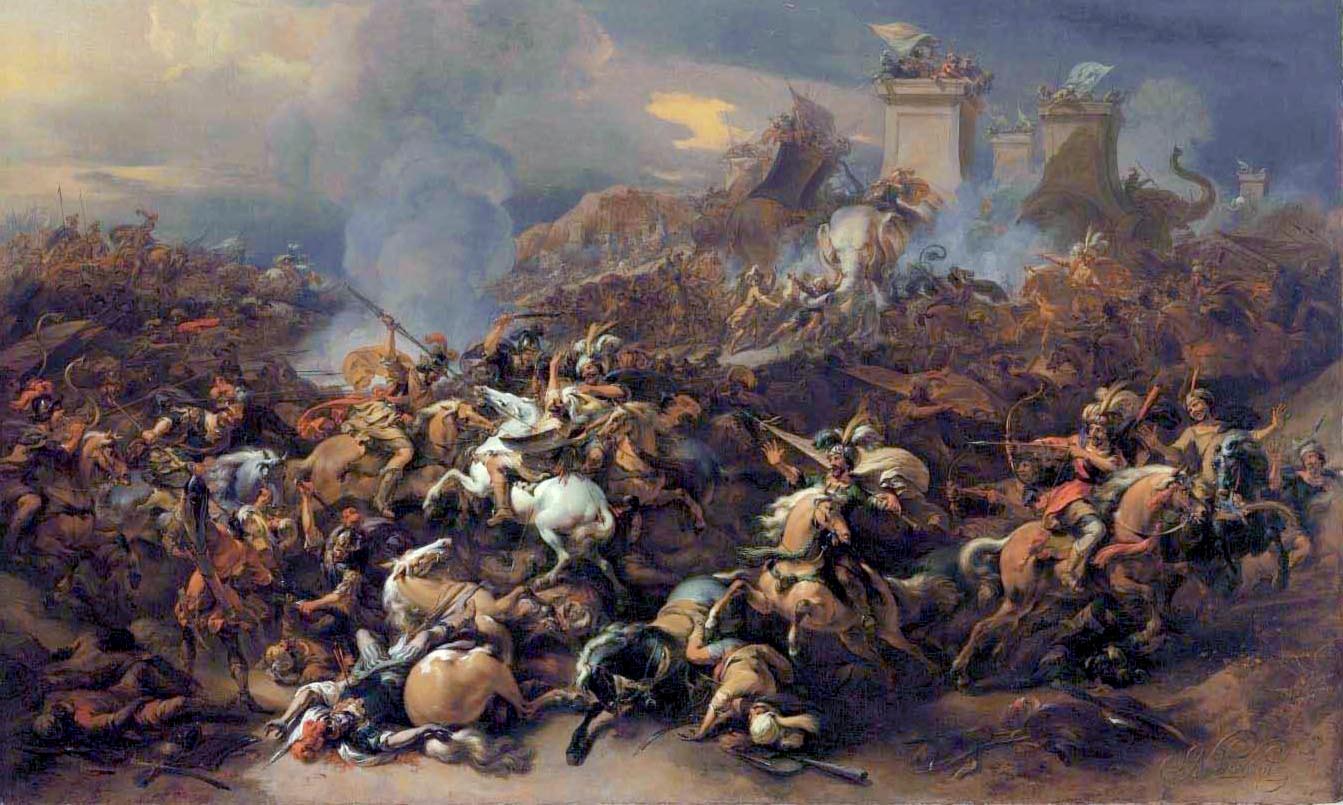

Alexander the Great in India
During the battle of Hydaspes Alexander and his men attacked the war elephants of Porus of India. Macedonian soldiers were flung into the air like dolls, or trampled underfoot. The bulk of the Indian infantry was waiting behind the pachyderms to attack.
By Martin Leavitt
It was raining, raining with a force and intensity few had ever experienced. The Macedonian army was marching upstream near the northern banks of the Hydaspes River in India (now Pakistan), trying to reach a ford under the cloak of darkness. The year was 326 b.c., the month probably May, and the Macedonians were in the latter stages of a campaign that, with some brief interruptions, had lasted almost eight years.
The rain came down in sheets, the droplets driven by howling gales, and lighting danced and crackled across the sodden skies. The bolts thundered and pealed, causing the rain to fall even heavier, as if the very floodgates of heaven had been rent asunder by the booming reports. The soldiers must have been soaked to the skin, wrapped in cloaks that were so wet protection was minimal.
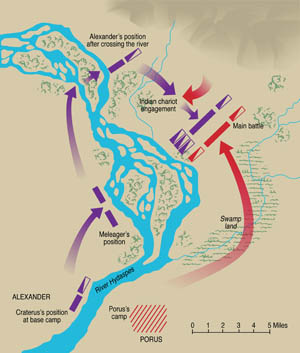
Alexander of Macedon, later known as Alexander the Great, was in the van of the army, sharing as usual the discomforts as well as the glories of war. He was probably pleased that the night was so stormy; Zeus the Thunderer was plainly coming to Macedonian aid. Just across the river a large and formidable Indian army under Rajah Porus of the Pauvaras was trying to block the Macedonians from crossing. The violent storm, coupled with the pitch-black night, would screen Alexander’s movements from the prying eyes of enemy scouts. Yet inclement weather alone could not insure battlefield success. Would the Macedonian king’s nocturnal maneuver be crowned with success?

Alexander Lauded For His Military Timing & Tactics
Alexander III of Macedon, in Greek Alexandros III Philippou Makedon, is without question one of the great captains of military history. He certainly looked the part of a hero. Alexander was handsome, with even features and a flowing mane of blond hair. He had one blue eye and one brown eye, though the startling contrast in no way altered his basic appeal. He was athletic and tough, and though he was shorter than average his charisma made him seem larger than life. Alexander was courageous, yet rarely, if ever, foolhardy; he usually looked before he “leaped.”

Some historians, eager to debunk the legend, have tried to downplay his military talents by attributing his victories to subordinates. It seemed inconceivable to them that military genius could dwell in one so youthful, yet he began to command armies at 16. Even when elements of the legend are stripped away the facts speak for themselves: Alexander the Great was a military genius. He had a keen eye for terrain, a good sense of timing, and a solid knowledge of tactics. Above all he was adaptable, able to alter his plans to reflect changing circumstances. If he had one fault it was his tendency to unduly expose himself to danger and fight like a common soldier—a trait that nevertheless endeared him to his men.
Greek Coalition Defeated; Macedonia Rises
In the fourth century b.c. Macedonia was a state just to the north of Greece. Its population was an amalgam of several peoples, with at least some infusion of Greek blood. Its language was a reflection of this polyglot nature; Macedonian had Greek elements in it, but was so diluted with “barbarian” words most Greeks could not understand it. Nevertheless, Macedonia did have a patina of Greek civilization and was Helenized enough for its athletes to be accepted as competitors in the Olympic Games. Certainly, both Alexander and his father Philip II were strong admirers of Greek culture.
Philip II laid the foundations of Macedonia’s greatness. At the battle of Charonea in September 338 b.c., Philip defeated a coalition of Greek states that included Athens. Although he granted them a measure of autonomy, Philip made it clear that Macedonia would not stand for the bickering and fratricidal bloodshed that had been a hallmark of Greek politics for decades. Philip imposed peace and unity on Greece by forcing all Greek states save Sparta to join a Macedonian-dominated League of Corinth.
Alexander Assumes Crown After Assassination
Philip now looked across the Aegean to the Persian empire, long an enemy of the Greeks. In fact, in 490 and 480 b.c. Persian kings had invaded Greece in an attempt to make the country part of their empire. They failed, but the enmity between the two cultures remained. Philip proposed to invade the Persian empire, his first goal to liberate the Greek city states in Asia Minor. But Philip was assassinated in 336 b.c. at the age of 46 before his plans could reach fruition. Alexander, a young man who had shown his mettle in battle but was still only 20 years old, assumed the crown.
There was no question that Alexander would pick up where his father left off. In the fourth century b.c. conquest did not need to be justified, and Macedonian kings were expected to be warriors. Alexander was bursting with ambition, eager to make a name for himself. His old tutor, the Greek philosopher Aristotle, instilled in Alexander a love for all things Hellene. Conquering the Persian empire would fulfill his personal ambitions and satisfy a desire to the “avenger” of Greece.
Alexander’s army crossed the Hellespont into Asia in the spring of 334 b.c. It was the beginning of an odyssey that would conquer an empire and travel to the farthest limits of the known world—the known world, that is, of Greek classical civilization. In the battles of Granicus (334 b.c.), Issus (333 b.c.) and finally at the climatic battle of Gaugamela (331 b.c.), Alexander defeated the armies of King Darius III. When Darius was murdered by his own men Alexander’s victory over the Persians was complete.
The Indian Expedition
But once started, conquest can be a kind of addiction, a process that can prove an irresistible temptation. At least, it seemed to be so in Alexander’s case. The eastern provinces of Bactria and Sogdiana had been only loosely attached to the old Persian empire; Alexander decided to go there to make sure of a firmer connection. After some time in Bactria and Sogdiana, the Macedonian king was determined to go to India. Perhaps he wanted to follow in the legendary footsteps of Dionysus and Heracles (Hercules); the Macedonian royal family claimed descent from Heracles.
Maybe Alexander was motivated by a desire to explore the unknown. The Macedonian king believed, as did most educated people of the classical times, that the land mass of Europe and Asia was surrounded by a great body of water known as the Ocean Stream. In Greek thought, Europe and Asia were a giant “island” set in the vast ocean. Alexander wanted to see the Ocean Stream with his own eyes, at the same time setting the boundary of his empire to the edge of the world.
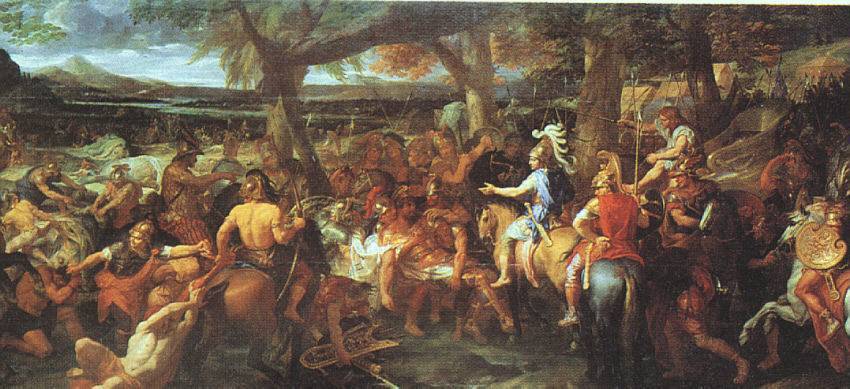
Apparently Alexander gave considerable thought to this Indian expedition and planned accordingly. Before this time most soldiers wore corselets/cuirasses; now they were being discarded, presumably for greater ease and mobility. Yet the change was probably not universal; some units or even individuals most likely maintained the old armor, even if it was hot and cumbersome.
Seeking To Bridge The Indus
The Macedonian army’s initial objective was the region around the great Indus River, in the area that today is generally called the Punjab. The Indus is one of the world’s great rivers and a cradle of civilization. It rises in the Himalayas then continues some 1,700 miles before emptying into the Arabian Sea. The Indus has four tributaries, which the Greeks called the Hydaspes, Acesines, Hydraotes, and Hyphasis. (Today they are the Jhelum, Chenab, Ravi, and Beas.) The region was poetically dubbed the “land of the five rivers,” but to Alexander and the Macedonians waterways were barriers to overcome, not objects of romance.
Alexander sent his subordinate Hephaestion ahead to the Indus while the king himself dealt with troublesome hill tribes. Hephaestion began bridging the broad Indus in anticipation of Alexander’s arrival with the main body. Little is known about how the Macedonians bridged the Indus, but Arrian, a Greek writer who lived in Roman times, suggested a bridge of boats. The bridge consisted of a line of boats or galleys placed side by side with a roadbed on top.
In the meantime, Alexander started to march toward the Indus, en route giving orders to have trees felled for the construction of boats. Luckily, there were trees not far from the river that yielded high-quality lumber, and before long boats and galleys were sliding into the brown river waters. Meanwhile, Hephaestion completed the bridging of the Indus, a major engineering feat and the start of a new phase in the campaign. Alexander marked the occasion with sacrifices to the gods, athletic competition, and displays of horsemanship.
A New Foe Emerges On The Eastward March
The ceremonies over, Alexander crossed the Indus and marched on Taxila, a kingdom between the Indus and the Hydaspes rivers. The ruler of Taxila, whose real name was probably “Amphi,” was dubbed “Taxiles” by Alexander as a kind of dynastic title. Amphi/Taxiles proved a good friend to Alexander, allowing the Macedonians to rest and refit. Taxila was the crossroads of several trade routes to Bactria, Casmir, and the distant Ganges River valley.
Alexander was not unmindful of Taxiles’s support and rewarded the Indian prince with additional territory. Northwestern India was a patchwork of kingdoms, and several rulers sent representatives to treat with the Macedonian king. Porus, king of the Pauravas, failed to send an envoy. In fact, such an ambassador was conspicuous by his absence. It was then the truth must have dawned, and the reason for Taxiles’s eager friendship made clear: he and Porus were bitter enemies. Taxiles hoped to enlist Alexander’s aid in the feud. The Macedonian was more than happy to oblige; he wanted to go further east, and Porus’s kingdom blocked the way. If Porus could not be coaxed into an alliance, Alexander was more than ready to go to war.
Porus’s kingdom lay beyond the Hydaspes, which in the spring of 326 b.c. was a barrier of major proportions. Melting snows from Himalayan peaks combined with heavy rains to transform a placid, meandering stream into a foaming, raging torrent filled with treacherous currents. Porus stationed his troops along the southern bank, in essence using the river as a gigantic natural moat to protect his realm. The rajah paid particular attention to the fords, posting soldiers to make sure that, even if Alexander was lucky enough to thwart the forces of nature, he would not succeed in establishing a toehold on the south bank.
Preparing For War
Alexander established a base camp on the banks of the Hydaspes just opposite Porus’s own camp across the river. The Macedonian camp was plainly visible to the Indians, but Alexander purposely chose the site so he could be observed. Although acutely aware of being watched, the Macedonians nonchalantly set up their tents, prepared food, and undid bed rolls for sleep. Alexander’s army was a multinational force composed of many peoples. There were various Asiatics and even Indian soldiers from his new allies. Greek mercenaries were there, distinctive because of their full beards; Macedonians were clean shaven by Alexander’s express orders. The Macedonians were the heart of the army, and Porus must have had some curiosity about the appearance and habits of his new foes.
Years of almost constant campaigning had taken their toll on the men’s clothes and equipment. Many were shabby, their tunics threadbare and worn, and replacement Greek dress was hard to come by. Some recut Indian garments, some adopted Persian dress, and some mixed national styles in a “crazy quilt” fashion that must have amazed enemy observers.
The Toughest Battle of Alexander’s Career
Alexander knew he faced a challenge, one of the greatest of his career. The river was well-nigh impossible to cross in its present state, yet he couldn’t wait until winter reduced the waters to fordable levels. Even if he did attempt a crossing, Porus had a weapon that might tip the scales against the Macedonians: war elephants. The rajah had 100 to 200 of these great beasts (accounts vary), and their size and loud trumpeting usually terrified horses which were not used to them. The Macedonian cavalry was one of the key elements to Alexander’s success; elephants might neutralize this advantage. In truth, the elephants were also a terror to men as well as horses. A way had to be found to deal with them.
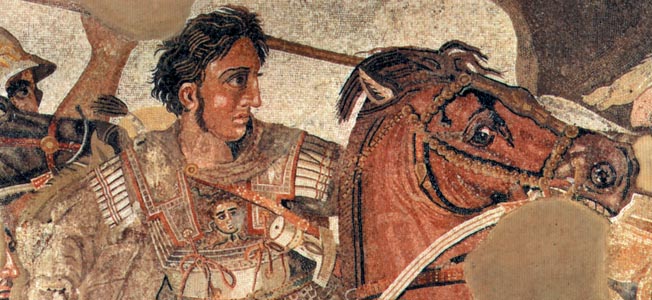
Yet time was running out, and delay might be fatal to the Macedonian cause. A Rajah Abisares of Casmir seemed about to join Porus against Alexander, and his army was as least as large as that of the Pauravan king. If the two rajahs united, Alexander might well find himself in serious difficulties.
A Cat-And-Mouse Game With Porus
For the next few weeks Alexander played a kind of cat-and-mouse game with Porus, doing all he could to deceive the Indian and keep him off balance. Macedonian troops were in constant movement, with detachments probing up and down the river as if preparing to cross. Since it was well known that Alexander was usually with his assault troops, the king resorted to a double to mask his personal movements. Attalus, a soldier who bore a striking resemblance to Alexander, walked about the royal pavilion and around camp when the king was not present. For days on end Macedonian cavalry would be seen at various points, as if a vanguard to a major crossing attempt, yet when Porus sent troops to the threatened sectors, the Indians would find their adversaries had disappeared.
Moving On His Complacent Foes
Porus must have been frustrated and baffled. Macedonian soldiers would march up and down making as much noise as possible, trumpets blaring, men shouting war cries and oaths. Finally, after several weeks of such maneuvers, the Indian king began to relax his guard. His troops were exhausted, worn out by trying to counter Alexander’s feints. Perhaps Porus began to think that Alexander’s movements were mere bluff, designed to conceal the fact that the Macedonians were going to wait for the winter and the river to recede. In fact, Alexander himself mentioned he would wait until winter, knowing such announcements would find their way back to Porus.
Alexander had no intention of waiting until winter, but decided on crossing the Hydaspes at night, right under the very noses of the Indians. Indian scouts’ senses, dulled by false alarms, were so inured to the sounds of enemy troop movements they would scarcely notice the noise of a crossing—or so Alexander hoped.
The crossing of the Hydaspes was a masterpiece of maneuver and a fitting prologue to the subsequent battle. Alexander outlined his plans during an emergency conference that was held probably in his royal pavilion. As previously mentioned, the king had decided on a surprise night crossing and, once on the southern bank, hoped to defeat Porus before Abisares could come up. Craterus was left in command of the base camp with about 2,000 cavalry and 9,000 infantry. Porus was still in camp with nearly his whole army, but once he realized Alexander was on the move he was sure to follow.
The Macedonians Hide Their Forces On Island
Alexander told Craterus not to cross the river unless Porus had moved his whole army upstream, or he was sure the Macedonians had been victorious. The Macedonian king now moved upriver, his goal a point just opposite Adamana Island. Alexander hoped to use Admana as a giant shield against the eyes of Porus’s scouts. He’d embark his strike or turning force on galleys behind the island, then go downstream with Admana to his left still blocking the Indians’ view. The Macedonian flotilla would round the tip of Admana and go ashore on the southern bank beyond.
En route to the crossing place Alexander detached Meleager, Attalus, and Gorgias with some 1,000 cavalry and 16,000 infantry about halfway between the base camp and Admana Island. Like Craterus, the trio were ordered to cross the river only if they determined Porus was occupied, that is, engaging Alexander. Now Alexander’s foresight and careful planning began to reap rich rewards. Some weeks earlier he had dispatched one of his officers, one Coenus, to the Indus with orders to bring back the galleys and boats the Macedonians had used there. To accomplish this task the galleys were cut in three sections, the smaller boats in two sections, and their pieces transported by wagon to the Hydaspes and reassembled.
The Long March To Admana Island
Alexander’s march to the Admana Island area assembly point took him inland, but the snaking course of the Hydaspes made the route a kind of shortcut. It must have taken hours for the Macedonian strike force to reach the assembly point; one historian estimates the 17- or 18-mile journey must have taken at least six hours under monsoon rain conditions. When the king arrived he found the oared galleys and boats waiting for him. Everything was falling into place; in addition to the troops under Meleager already mentioned, Alexander had posted small detachments all along the river, a “chain of communication” that linked him with the base camp under Craterus some 18 miles away. Signals could be relayed via trumpet calls.
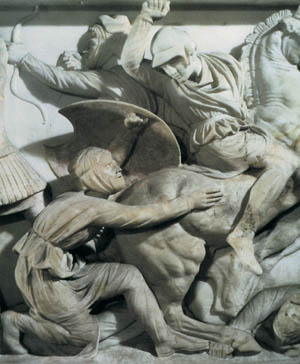
The most notable unit in Alexander’s force was the royal squadron ( Basilike ile ) of the elite Companions ( hetairoi ) cavalry, known also as the agema or Royal vanguard. Alexander himself wore the striking purple tunic and cuirass of a senior Companions officer. The royal agema was supplemented by the hipparchies (cavalry unit, from the Greek word hippus , horse,) of Hephaestion, Perdiccas, and Demetrius. Each hipparchy had about 1,000 horsemen. There were also allied cavalry of Bactrians, Sogdians, and hard-riding Dahae archers and Sythians. Alexander’s infantry consisted of two phalanx pike units under Coenus and Clitus, some hypaspists (probably light troops) and various Asiatic allies. The king must have been eager to reach the southern bank of the river; if Porus caught the Macedonians in the act of crossing, or even partly across, the results could be disastrous. Large wooden rafts were constructed and given added buoyancy by attaching straw-filled watertight skin floats. The cavalry would be transported on these rafts, a delicate and time-consuming operation as well as a vulnerable one. If Porus’s war elephants appeared as the horses were embarking or disembarking, utter chaos might ensue. Even if they were still on the rafts midstream, the horses might still try to drive into the river if they heard or saw the elephants or caught their scent.
Flotilla Moves Seen By Indians
The flotilla set out before dawn, Alexander leading the way in a 30-oar galley that was towing a cavalry raft. Some of his closest personal companions were with him on the galley, including Ptolemy, son of Lagos. Ptolemy, later ruler of Egypt, left an account of the Indian campaign that was a source for later historians.
Dawn finally broke over the eastern horizon; the rain storm had abated, and the discomforts of the night must have been forgotten in the excitement and anticipation of battle. As planned, Admana Island blocked the view of the Macedonian fleet from the river shoreline, but once Alexander’s galley nosed around its western tip, the vessel was spotted by Porus’s scouts. Mounting their horses with alacrity, the scouts galloped back to their rajah with the news that the Macedonians were at last on the move.
Macedonians Make It To The Shore
Alexander was first ashore and started to supervise the disembarkation of his men. But it was soon discovered that the Macedonians were not on the southern bank of the river, but only on another island! This long finger of land ran parallel to the real southern bank and from a distance blended with it. As seen from the Macedonian side of the river, there was not the slightest hint it was an island. This was a major setback for the Macedonians, a crimp in what had been so far a flawlessly executed operation.
The channel between the real southern bank and the island was narrow, but also deep with treacherous currents. A passable ford was found, and the hapless Macedonian troops had to wade across it with water up to their shoulders. Even the horses had a rough time of it, the water coming up to their necks. It must have taken several hours to cross the ford, precious hours where Porus could have regained the initiative and attacked Alexander when he was at his most vulnerable. Timing is everything in war, and rarely are generals given a second chance. Porus missed this golden opportunity, and Alexander managed to get his entire force safely on shore.
Porus’ Son & Macedonian Forces Colide
Knowing that Porus’s army was somewhere downstream, Alexander led his cavalry south at a rapid pace, ordering the infantry to follow as best they could. Porus had indeed received the reports of a Macedonian crossing, but it still seemed that Alexander’s main force (really just Craterus) was still encamped across the river. Puzzled, Porus decided to send his son (some say brother) with a reconnaissance force of cavalry and chariots to see what was going on upstream. Was this crossing Alexander’s main force, or merely a diversionary feint?
This Indian scouting force consisted of some 2,000 cavalry and 120 chariots, far too little to deal with Alexander had they known he was there. The Macedonian king drew rein at the sight of the cavalry and chariots, uncertain if this was the van of Porus’s whole army. When he determined it was a detached force, Alexander led his Companions cavalry against Porus’s son. The chariot was obsolete tactically, and the Indian cavalry was no match for battle-hardened Macedonian troops.
Alexander Defeats Detached Force
Alexander’s horse archers unleashed showers of arrows into the chariots, killing and wounding drivers and warrior passengers with random impartiality. Each Indian chariot must have made a good target, for these large fighting platforms held six men—only two of whom had shields. The horses that drew the chariots were probably also hit with these lethal shafts, and once a horse was down in harness, that chariot was rendered instantly immobile. Once the charioteers were “softened up” by the archer’s stinging shafts, Alexander moved in with his Companions cavalry to finish the job.
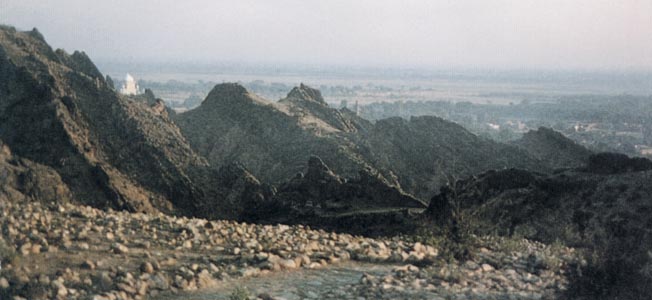
The Companions cavalry moved forward at a gallop, the soldier’s purple tunics blending to form an undulating purple band across the horizon. Purple and yellow cloaks billowed behind them, and each soldier was wearing a bronze helmet in the Boeotian style, with a large curved “floppy” brim that gave the wearer an excellent field of vision. Although often depicted as bare headed for artistic purposes, Alexander himself often wore a Boeotian helmet. The members of the Companions cavalry were superb horsemen. They had to be; the ancients did not have stirrups. Each Companion cavalryman wielded a xyston, a long lance that featured a spear point on both ends. Made of sturdy cornel wood, it nevertheless frequently shattered in battle. That is why there was a spear point on both ends; if a lance shattered, a cavalryman could quickly reverse the haft and fight on.
The Indian charioteers were hard put to mount an adequate defense. Not only were Alexander’s men pressing on all sides, but the chariots had lost their main battle advantage—mobility. The soft clay near the river had been turned into a quagmire by the heavy rains, and the churning caused by horses’ hooves and chariot wheels made it worse. Within a very short time the chariots’ defense ground to a halt, literally bogged down in the mud. Those charioteers and cavalry not killed by the Macedonians took to their heels—or hooves—in a frantic attempt to escape. They left behind 400 dead, including Porus’s own son. It is said that virtually all the chariots—probably many disabled or deep in mud—were captured.
Porus Prepares For Battle
Porus was informed of the disaster, but took the evil tidings like a king, setting aside his personal feelings to deal with the crisis at hand. The rajah decided to give battle, but forewarned by his son’s fate he chose his ground carefully, selecting a broad sandy plain that would be suitable for cavalry.
Again, authorities differ on specifics, but Porus probably had 4,000 cavalry, 300 chariots, 200 elephants, and 30,000 infantry. The typical Indian infantryman was an archer, his principal weapon a heavy bamboo bow that shot an unusually long arrow. It must have taken strength to draw the bow, because Greek sources maintain Indian arrows could pierce corselets and shields with little difficulty. The Indian infantryman wore no armor; bare chested, he merely had a white cotton skirt girded around his loins. The Indians generally wore no helmets, either, but pulled their black hair into a topknot, bun, or small “ponytail.”
Porus’ Biggest Weapon? Gray “Battering Rams”
Porus placed his most formidable weapons, the war elephants, in his first line of battle. The elephant was something new to the Greeks and Macedonians, and certainly Alexander had never faced such a terrible threat. When properly used, elephants could be terrifying, great gray “battering rams” whose metal-tipped tusks could rend and gore and whose huge feet could trample and crush. The elephants were placed at 100-foot intervals with some infantry between the gaps to protect the elephant’s flanks. The bulk of the Indian infantry was behind the pachyderms and formed the second line of battle. Cavalry and chariots protected the army’s flanks.
Meanwhile, Alexander was advancing toward Porus’s assembling army. When the king and his Companions cavalry saw that the Indians were offering battle, he paused to let his own infantry come up and rest. Even though many were veterans who were inured to hardships, the march must have been a taxing one. Some may not have had body armor, but they did have helmets, swords, shields, and spears, and these tools of a soldier’s trade added extra weight.
They were marching in muddy ground, and it must have seemed to the Macedonian infantry that the very soil of India was on Porus’s side. Every time a soldier made a step, he sank deeply into the mud, and when he raised his foot, he would find it nearly trapped in the mud’s viscous embrace. Once the mud-spattered infantry arrived, they must have welcomed the rest Alexander allowed them. There was a practical reason why the king allowed them a “breather”; he didn’t want to have his winded troops engage a fresh enemy.
The Battle of Hydaspes was about to begin. The actual date of the battle is a matter of considerable dispute. The ancient writer Diodorus places it in “the archonship of Chiemes at Athens,” that is, about July. In one passage Arrian maintains it was in the Attic month of Munchion, or in about April/May. Yet later he contradicts himself by saying the battle was “after the summer solstice,” which would be after June 21. The “jury is still out” on the matter, but most sources say the date was May 326 b.c.
Exposing The Indian Horseman
Alexander opened the battle by sending a swarm of horse archers against the cavalry on the Indian left. It was a tactic he used earlier against the chariots, but now the stakes were much higher. Pelted by the arrow storm, the left-wing Indian cavalry moved against their swift-riding tormentors. This is exactly what Alexander hoped they’d do: Once exposed, the Indian horsemen would be easy prey for his Companions cavalry.
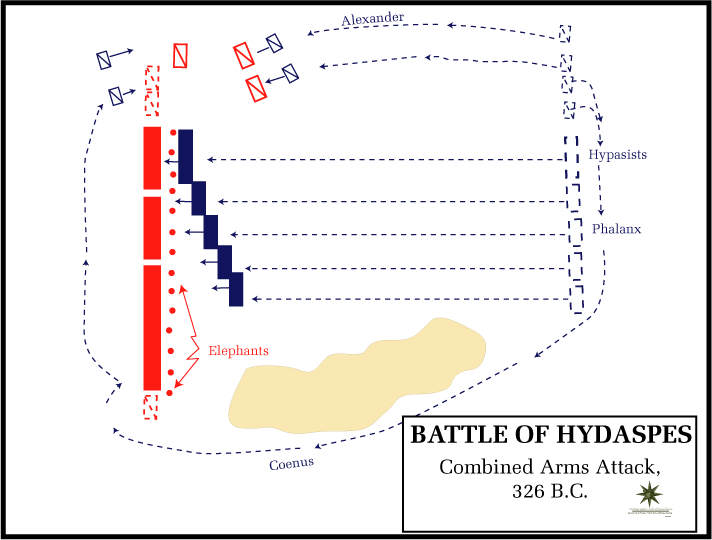
The king personally led his men forward, his Companions as usual in the van. The Macedonian cavalry smashed into the opposing horsemen like a juggernaut, the battlefield quickly dissolving into a bloody chaos of flailing hooves, clashing swords, and thrusting lances. Alexander was in the very midst of the melee, giving little thought to his personal safety as he traded blows with Indian horsemen.
Alexander Offers Himself As Bait
When Porus saw what was happening he ordered cavalry from his right wing to come to the aid of those on the hard-pressed left. The Indian right-wing cavalry moved in a kind of oblique fashion across the battlefield, riding in the “no man’s land” between the two armies. Apparently these right-wing “rescuers” were just about to fall on Alexander when Macedonian horsemen appeared in their rear as if by magic.
Alexander had been the bait, and now the Indian cavalry was well within the trap. In a prearranged maneuver orchestrated by Alexander, Coenus had taken at least one hipparchy and swung around to attack the Indian cavalry from the rear. Coenus had taken a wide, circuitous route; some speculate he had ridden behind the Macedonian infantry to conceal his movements and maintain the surprise. In any event, the Indian cavalry was thrown back in utter route, the survivors seeking refuge with the elephants.
Porus’ War Elephants Ready To Charge
Almost as if on cue the war elephants now took center stage, lumbering out to the attack. The Macedonian infantry accepted the challenge, but the situation was spine-chilling: A solid gray wall of powerful beasts, each weighing upward of two tons, rapidly closed the gap between them. As the elephants drew closer and the gap between the two sides grew narrower, the Macedonians were probably awed by these living fortresses of muscle, ivory, and bone. Trunks poised in a s-curve, the elephants trumpeted again and again, their cries heard distinctly over the din of battle. The celebrated Macedonian phalanx was about to receive an elephant charge; would it stand up to the test?
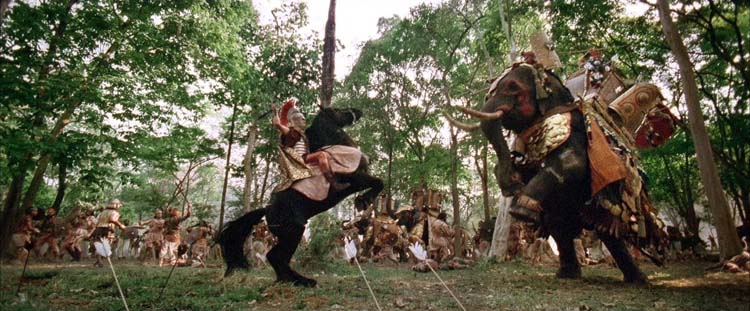
Along with the Companions cavalry, the Macedonian phalanx was a pillar of Alexander’s successes. The phalanx was a formation consisting of 16 files of men, each soldier armed with a two-handed pike of Balkan origin called a sarissa (plural sarissai) The sarissai were very long, about 15-18 feet from butt to spear point, and the use of such weapons required highly trained soldiers. Drill must have been constant.
Macedonian Phalanx Clash With Porus’ Elephants
The heart of the Macedonian phalanx formations were the Foot Companions, ( pezhetairoi ), formed into battalions usually named after their commanders. Like the cavalry some of the Foot Companions may have worn corselets/cuirasses, but it is certain all wore bronze helmets. The “Phrygian” style, which featured a bulbous crown that was likened to a cockscomb, seemed to be most popular. Most infantry helmets seem to have been painted blue, possibly an infantry color. Most soldiers had swords as secondary weapons and shields for protection. Since the sarissa was a two-handed weapon, some authorities have suggested that the shield was hung on a strap around a soldier’s neck to free his arms.
The leading ranks of the phalanx formations lowered their pikes, thus presenting a prickly forest of points to the onrushing elephants. Details are sketchy, but apparently the elephants smashed through the sarissai like so many matchsticks. The Macedonians were also throwing javelins—smaller, lighter spears—and both javelins and pikes began to find their marks. Unfortunately, wounds only enraged the elephants, goading them into a nearly uncontrollable fury. Ponderous heads slashed left and right, impaling Macedonian soldiers on their tusks, and probing trunks grasped struggling soldiers and flung them into the air like dolls. Other Macedonians were trampled underfoot, crushed into bloody pulp by rearing pachyderms.
Wounds Take Toll On Elephants
Yet other Macedonian soldiers brave or foolhardy enough to get close used swords and axes to chop and slash the elephants’ feet. Each elephant had a mahout or driver and one or two warriors on their backs. The warriors carried spears with bamboo hafts, and the mahout was also armed, but the real weapon was the elephant’s sheer brute strength. Behind their massive façade, however, the elephants had serious weaknesses. As noted earlier, they were very sensitive to wounds, and if wounded enough would go into paroxysms of fear and rage. Once in this state they were uncontrollable, dangerous to friend as well as foe. They also tended to go crazy in the heat of battle if their mahout was killed and they had no one to guide them.
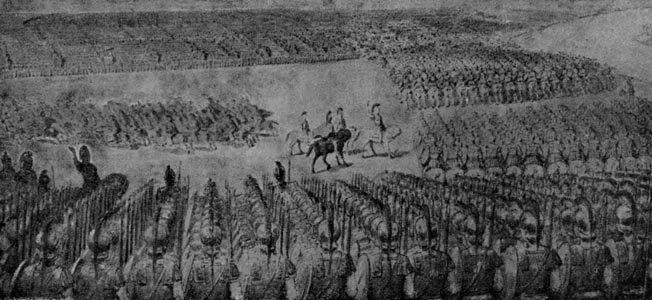
According to some sources Alexander had given orders on how to deal with the elephants before the battle was joined. The king told his men to concentrate missile fire on the lead elephants, with special attention paid to the mahouts/drivers. Obeying his instructions to the letter, Macedonian pikes impaled mahouts from all sides, tumbling the drivers from their high perches straddling the elephants’ necks. Javelins also did their work, wounding elephants and killing or wounding their riders. Maddened with pain, rage, and fear, the elephants began floundering about, trampling and goring Indians as well as Macedonians. The battlefield was transformed into an amorphous mass of infantry, cavalry, elephants, and even chariots all jammed together in bloody confusion.
Phalanxes Destroy The Indian Cavalry
The initiative passed to Alexander; the battle was won. The king ordered his phlangites (men of the phalanxes) into the “locked shield” or sysnaspismos formation. With this order the phalanx formations closed up on a narrower front, thus presenting a near-solid line of men, shields, and pikes to the enemy. Once in sysnaspismos , the phalanxes moved inexorably forward. The Indian cavalry and chariots were in disarray, and the Indian infantry was no match for the phalanx. By this time, weakened by wounds and exhaustion, the elephants were a spent force, and many were captured by the Macedonians.
Porus’s army disintegrated, the survivors taking to their heels at first opportunity. Their retreat was suddenly cut off by Craterus, who had crossed the river from the base camp when he judged the Macedonians had been victorious. His timing was impeccable, and thousands of Indians were cut down in flight. Some did manage to make their escape, but Porus’s army was finished as a fighting force.
Porus Belatedly Surrenders
Rajah Porus himself did not flee. He had fought with his troops and been wounded, but refused to surrender. By some accounts he remained on his elephant, spear in hand, defying the Macedonians and rejecting all notions of flight or capitulation. His old enemy Taxiles was sent forward in an effort to get him to lay down his arms, but old grudges were hard to forget, and Porus nearly speared the rival rajah. Another Indian went forward, and he was more successful. Porus came down from his elephant and surrendered; although feeling faint from his wound he presented himself to Alexander.
Some sources claim Porus was five cubits high—that is, about seven and one-half feet tall! Others maintain that his height was measured by the shorter Attic cubit, which would reduce it to a more believable 6 feet or so. In any event, he must have towered over Alexander, who was said to be shorter than average.
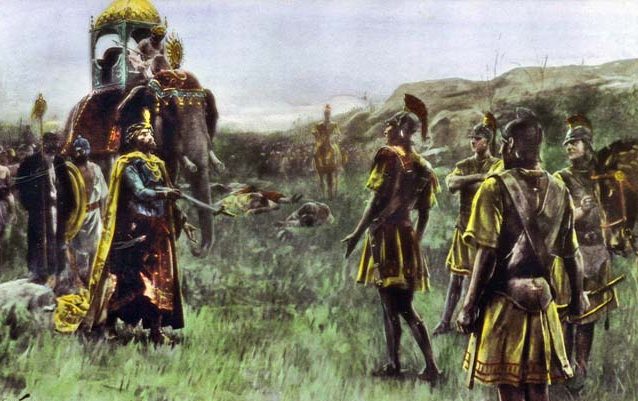
“Treat Me Like A King”
“What do you wish I should do with you?” Alexander queried, and Porus’s answer was straight and to the point. “Treat me like a king,” said the proud rajah, an answer that was said to have pleased Alexander very much. The Macedonian not only spared Porus, but he made him a client king.
Casualty figures for the Battle of Hydaspes vary widely. Diodorus, who is as good a source as any, claims Porus lost 12,000 men and 9,000 captured. Others say 20,000 Indians were killed. Diodorus places Macedonian losses at 280 cavalry and 700 infantry. Whatever the figures, Hyspades was one of the bloodiest and hardest fought battles in Alexander’s career.
Soldiers Munity; Alexander Ends The Eastward March
Alexander wanted to push on to the Ganges River some 250 miles distant. He was sure that the Ganges emptied into Ocean, and thus marked the end of the terrestrial world. His war-weary soldiers did not share this enthusiasm for exploration. They had fought in many campaigns and endured many hardships in the quest for glory, and now they had had their fill. They had campaigned for almost eight years and marched some 17,000 miles. Now, the Macedonians wanted to enjoy their spoils and see their families if they had any. The soldiers mutinied, refusing to go any farther, and even an impassioned speech by Alexander failed to sway them.
Alexander finally acquiesced and started the long trek of return. He never again saw his homeland. Three years into the journey back he died in Babylon, aged only 32. His empire proved ephemeral, but he crafted a lasting achievement—the spreading of Greek culture. His conquests marked the beginning of the Hellenistic age that would last for centuries.
Join The Conversation
Leave a reply cancel reply.
You must be logged in to post a comment.
Share This Article
- via= " class="share-btn twitter">
Related Articles
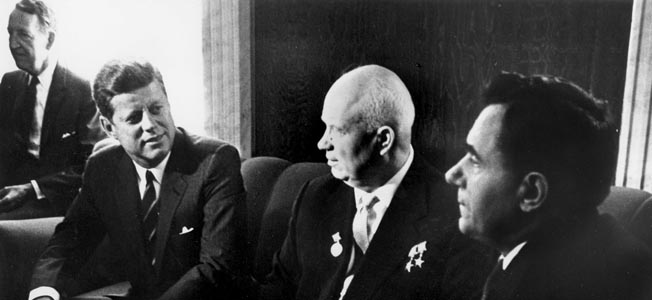
Military History
Cold War Intelligence
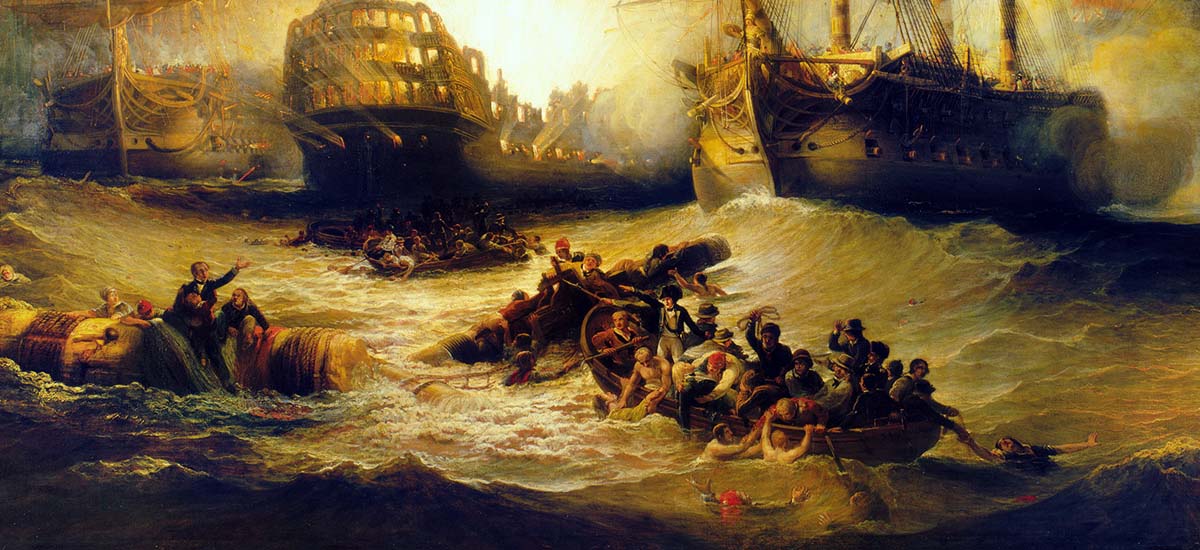
Thunder at Dusk: The Battle of the Nile
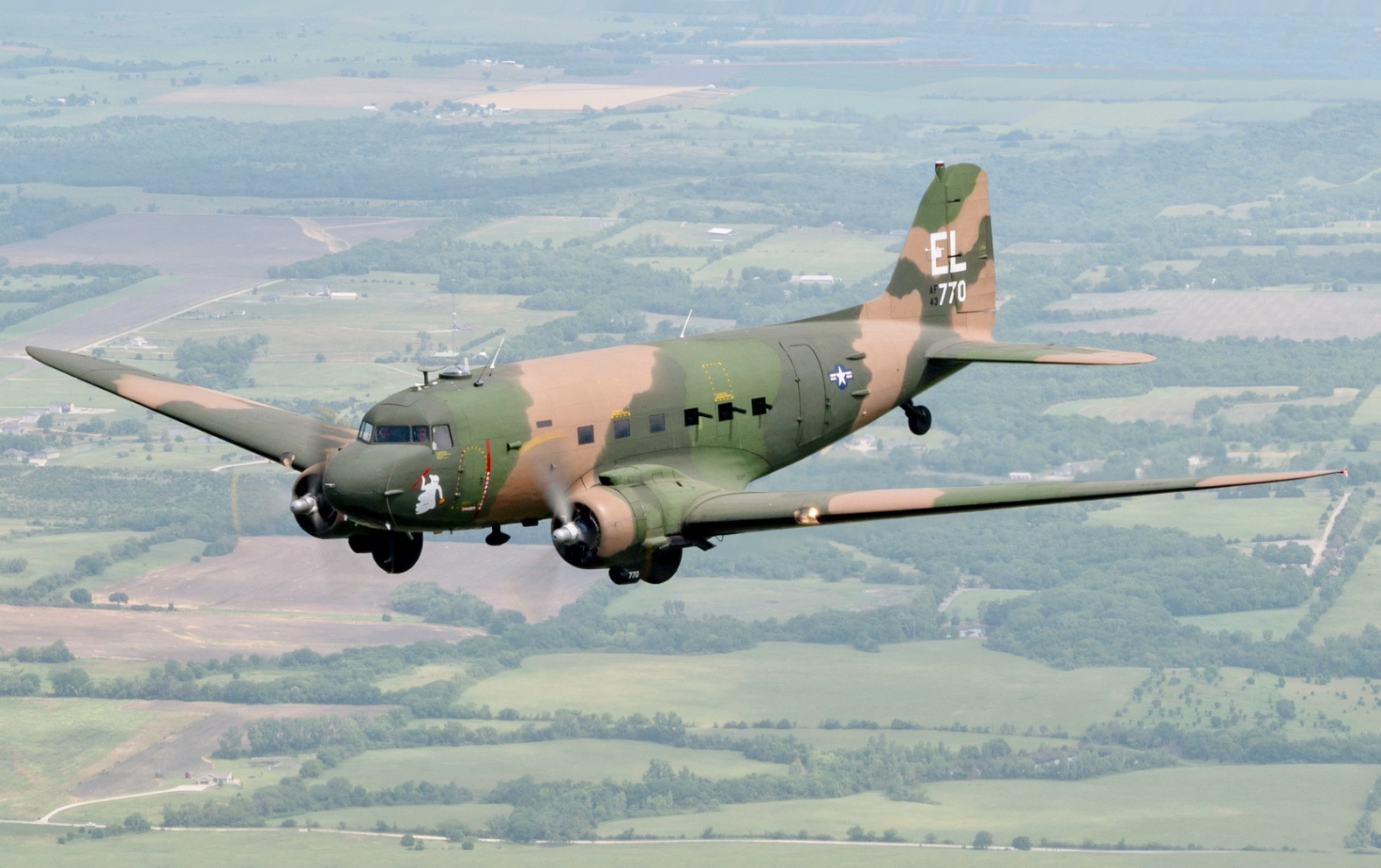
Vietnam: From the “Puff the Magic Dragon” Plane to the Lockheed AC-130
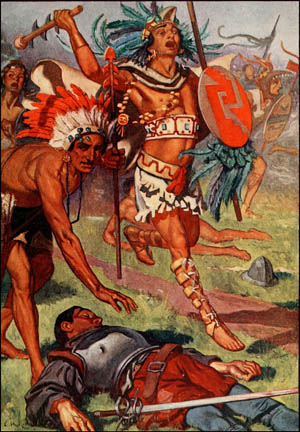
The Rise of the Aztec Civilization
From around the network.
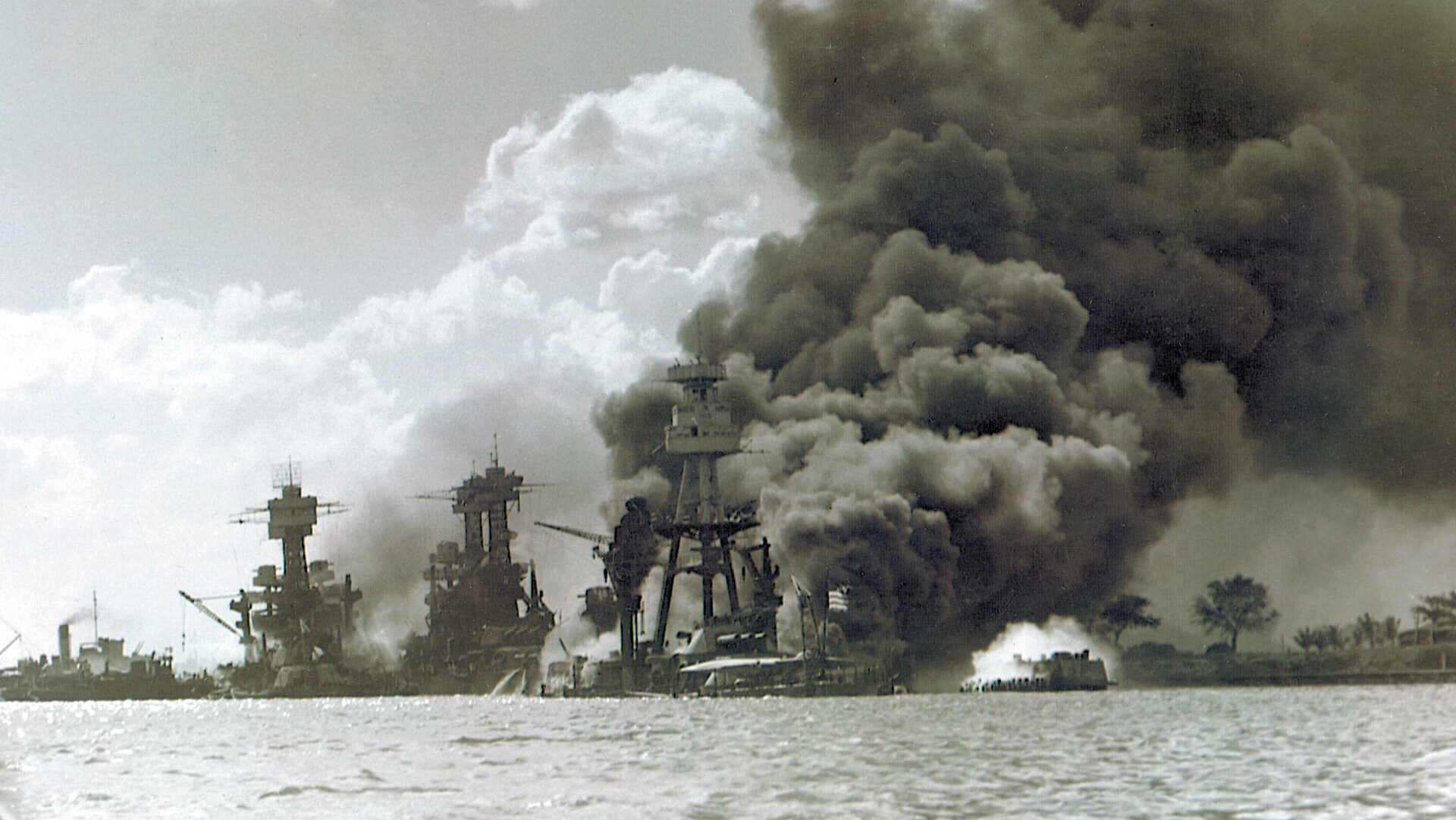
Presaging Pearl Harbor
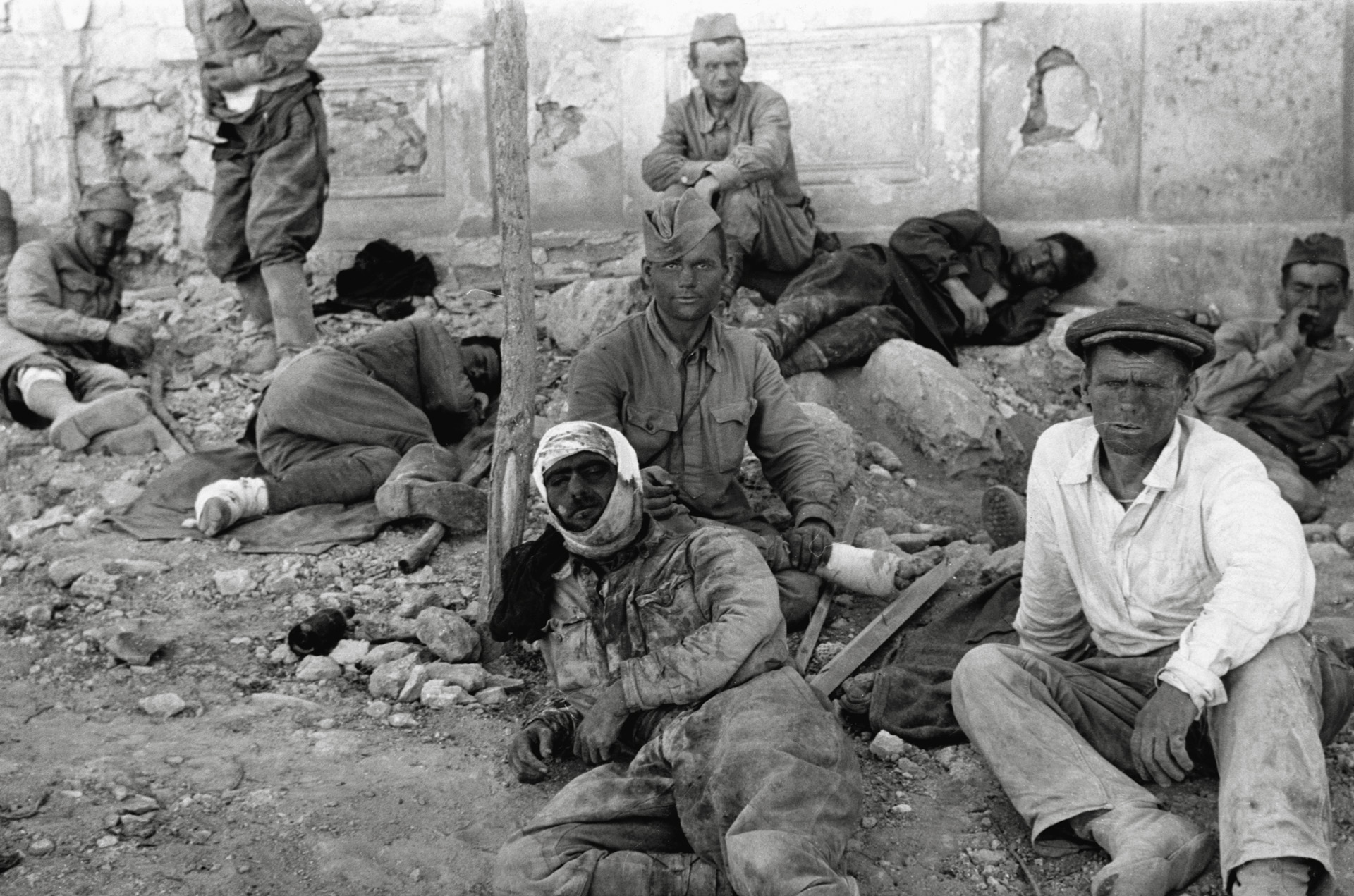
Sturgeon Catch 1942: The Siege of Sevastopol
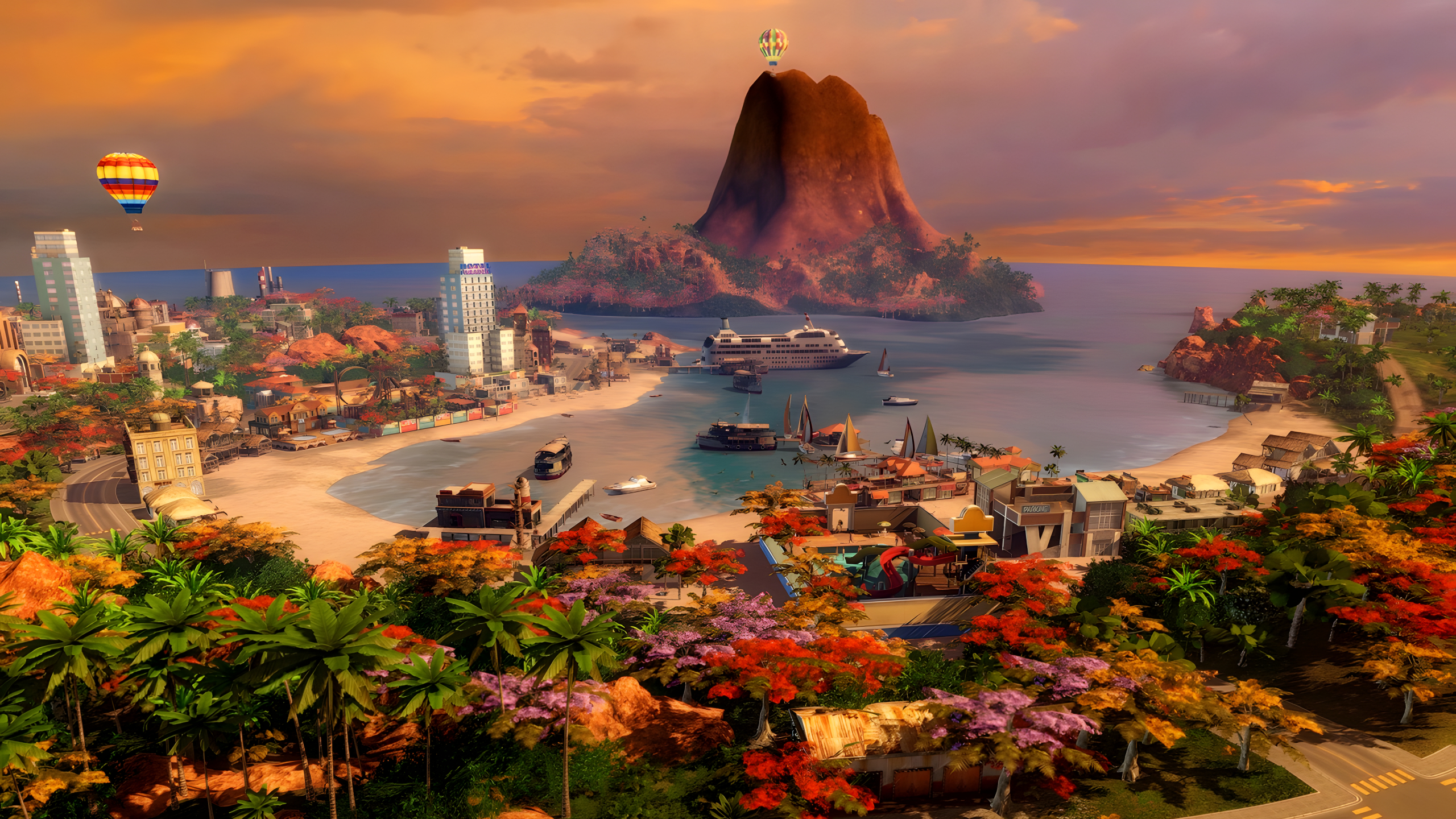
Military Games
Tropico 4: For the Would-Be Dictator
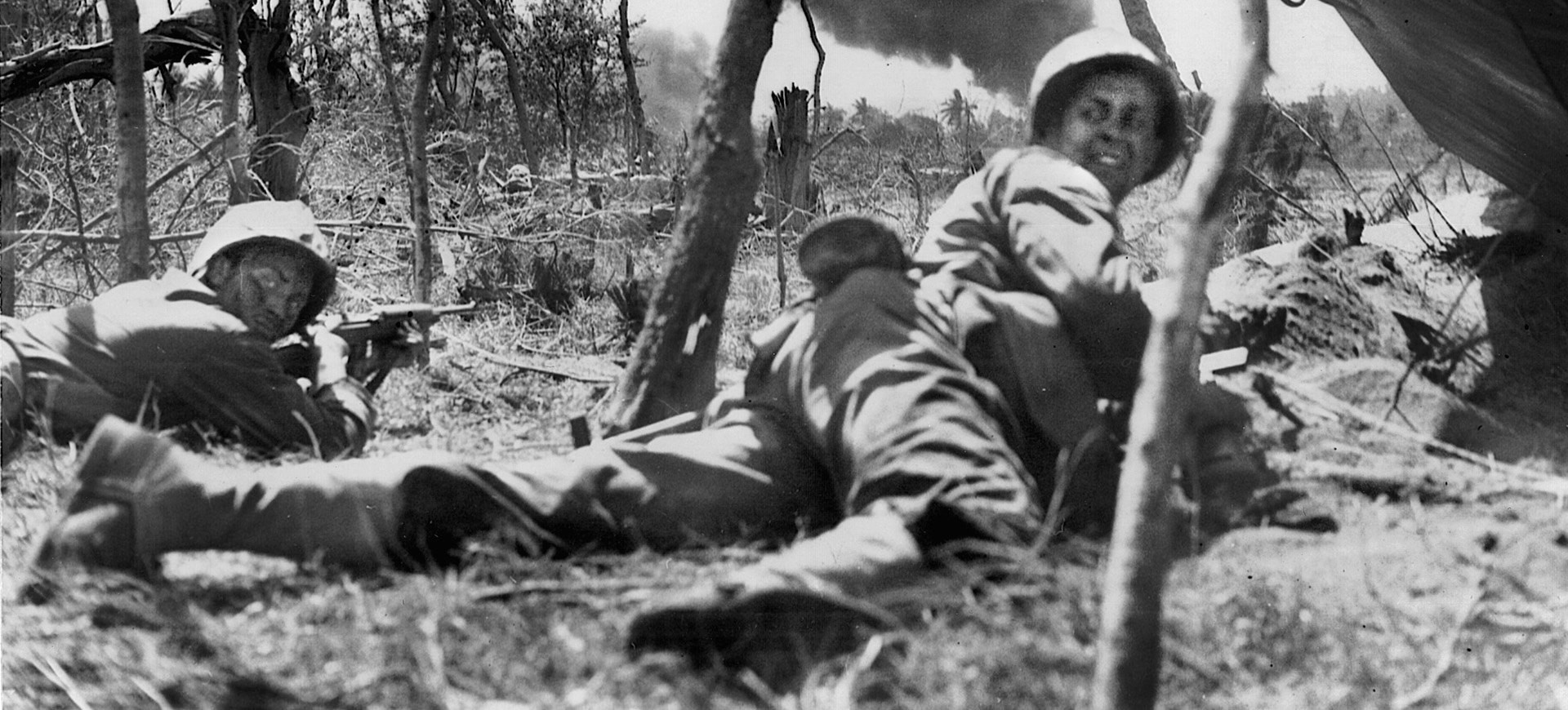
Latest Posts
- Alexanders Campaign
- Alexanders Indian Campaign
Alexander's Campaign > Alexander's Indian Campaign
Alexander's Indian Campaign

Indian Campaign
Part of the Campaign of Alexander the Great
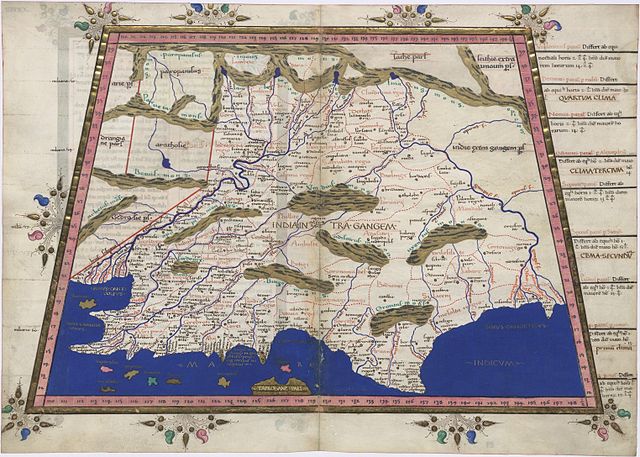
Ptolemy Tabula Asiae X (1467)
Dates: 327–325 BC
Location: Indus Valley
Coordinates: 38,0955830, 67,1841870
Aftermath: Macedonia conquers the Indus Valley, but fails to advance into the Ganges Plain.
Next Battle: Cophen Campaign
Previous Battle: Siege of Sogdian Rock
- Cophen Campaign
See Cophen Campaign
Notice : Undefined variable: aspis in /home/humanityhistory/public_html/addons/domains/alexander-the-great.org/alexanders-campaign/alexanders-indian-campaign.php on line 61
Notice : Undefined variable: aspis in /home/humanityhistory/public_html/addons/domains/alexander-the-great.org/alexanders-campaign/alexanders-indian-campaign.php on line 63
- Siege of Aornos
- Battle of the Hydaspes
Macedonian Revolt
- Mallian Campaign
See Mallian Campaign
Seleucid-Mauryan War
See Seleucid-Mauryan War
Alexander's Campaign
Balkan campaign, + balkan battles.
- Battle of Mount Haemus
- Siege of Pelium
- Battle of Thebes
Persian Campaign
+ persian battles.
- Battle of the Granicus (334 BC)
- Siege of Miletus (334 BC)
- Siege of Halicarnassus (334 BC)
- Battle of Issus (333 BC)
- Siege of Tyre (332 BC)
- Siege of Gaza (332 BC)
- Battle of Guagamela (331 BC)
- Battle of the Uxian Defile (331 BC)
- Battle of the Persian Gate (330 BC)
- Siege of Cyropolis (329 BC)
- Battle of Jaxartes (329 BC)
- Battle of Gabai (328 BC)
- Siege of Sogdian Rock (327 BC)
+ Indian Campaign Battles
Primary sources, secondary sources.
If you're seeing this message, it means we're having trouble loading external resources on our website.
If you're behind a web filter, please make sure that the domains *.kastatic.org and *.kasandbox.org are unblocked.
To log in and use all the features of Khan Academy, please enable JavaScript in your browser.
World history
Course: world history > unit 2.
- Philip of Macedon unifies Greece
- Alexander the Great takes power
- Alexander the Great conquers Persia
- Diadochi and the Hellenistic Period
Alexander the Great
- Alexander the Great was famous for his military power and is a legendary figure in history.
- Much of what we know about Alexander the Great is unreliable and steeped in myth; a lot of these mythologies were used by Alexander’s successors.
A history steeped in myth
The rise of an empire, alexander’s reign, want to join the conversation.
- Upvote Button navigates to signup page
- Downvote Button navigates to signup page
- Flag Button navigates to signup page

- History - Early History of India

ALEXANDER THE GREAT HALTS HIS CAMPAIGN AND HEADS DOWN THE INDUS TO THE ARABIAN SEA
Alexander's troops mutiny.
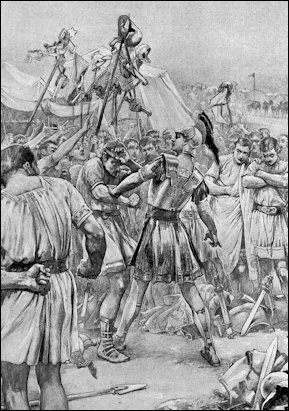
Alexander quelling the Opis mutiny
Alexander's next goal was to reach the Ganges River, which was actually 400 kilometers away, a considerable distance, because he thought that it flowed into the outer Ocean. His troops, however, had heard tales of the powerful Indian tribes that lived on the Ganges and remembered the difficulty of the battle with Porus, so they refused to go any farther east.
On the banks of the Hyphias (now Beas) River, Alexander ordered his men to head east, the men refused. Alexander was enraged and was little consoled by the words of one of his noble advisors, who told him, "A noble thing, O king, is to know when to stop.” Alexander reacted by saying anyone who disobeyed him would be accused of desertion and went to his tent to sulk. After confining himself to his tent from three days, he consulted his omens and was conveniently told he trouble awaited him in India. On hearing the news his men shouted: "Alexander allowed us, but no others, to defeat him."Alexander then decided to head back home. In retrospect this may have been a hasty decision as a major Indian army had already been defeated and all of India was within their grasp. Alexander was extremely disappointed, but he accepted their decision and persuaded them to travel south down the rivers Hydaspes and Indus to reach the Arabian Sea and ships that would take them home.
Arrian wrote: “It was reported that the country beyond the river Hyphasis was fertile, and that the men were good agriculturists, and gallant in war; and that they conducted their own political affairs in a regular and constitutional manner. For the multitude was ruled by the aristocracy, who governed in no respect contrary to the rules of moderation. It was also stated that the men of that district possessed a much greater number of elephants than the other Indians, and that those men were of very great stature, and excelled in valour. These reports excited in Alexander an ardent desire to advance farther; but the spirit of the Macedonians now began to flag, when they saw the king raising one labour after another, and incurring one danger after another. Conferences were held throughout the camp, in which those who were the most moderate bewailed their lot, while others resolutely declared that they would not follow Alexander any farther, even if he should lead the way. [Source: Arrian the Nicomedian (A.D. 92-175), “Anabasis of Alexander”, translated, by E. J. Chinnock, London: Hodder and Stoughton, 1884, gutenberg.org ]
Plutarch wrote: “On the banks of the Hyphias (now Beas) River, Alexander ordered his men to head east, the men refused. Alexander was enraged and was little consoled by the words of one of his noble advisors, who told him, "A noble thing, O king, is to know when to stop." Alexander reacted by saying anyone who disobeyed him would be accused of desertion and went to his tent to sulk. After confining himself to his tent from three days, he consulted his omens and was conveniently told he trouble awaited him in India. On hearing the news his men shouted: "Alexander allowed us, but no others, to defeat him."Alexander then decided to head back home. In retrospect this may have been a hasty decision as a major Indian army had already been defeated and all of India was within their grasp. [Source: Plutarch (A.D. 45-127), “Life of Alexander”, A.D. 75 translated by John Dryden, 1906, MIT, Online Library of Liberty, oll.libertyfund.org ]
“But this last combat with Porus took off the edge of the Macedonians’ courage, and stayed their further progress into India. For having found it hard enough to defeat an enemy who brought but twenty thousand foot and two thousand horse into the field, they thought they had reason to oppose Alexander’s design of leading them on to pass the Ganges too, which they were told was thirty-two furlongs broad and a hundred fathoms deep, and the banks on the further side covered with multitudes of enemies. For they were told that the kings of the Gandaritans and Præsians expected them there with eighty thousand horse, two hundred thousand foot, eight thousand armed chariots, and six thousand fighting elephants. Nor was this a mere vain report, spread to discourage them. For Androcottus,* who not long after reigned in those parts, made a present of five hundred elephants at once to Seleucus, and with an army of six hundred thousand men subdued all India.
“Alexander at first was so grieved and enraged at his men’s reluctancy, that he shut himself up in his tent, and threw himself upon the ground, declaring, if they would not pass the Ganges, he owed them no thanks for any thing they had hitherto done, and that to retreat now, was plainly to confess himself vanquished. But at last the reasonable persuasions of his friends and the cries and lamentations of his soldiers, who in a suppliant manner crowded about the entrance of his tent, prevailed with him to think of returning. Yet he could not refrain from leaving behind him various deceptive memorials of his expedition, to impose upon after-times, and to exaggerate his glory with posterity, such as arms larger than were really worn, and mangers for horses, with bits of bridles above the usual size, which he set up, and distributed in several places. He erected altars, also, to the gods, which the kings of the Præsians even in our time do honor to when they pass the river, and offer sacrifice upon them after the Grecian manner. Androcottus, then a boy, saw Alexander there, and is said often afterwards to have been heard to say, that he missed but little of making himself master of those countries; their king, who then reigned, was so hated and despised for the viciousness of his life, and the meanness of his extraction.”
Categories with related articles in this website: Ancient Greek History (48 articles) factsanddetails.com ; Ancient Greek Art and Culture (21 articles) factsanddetails.com ; Ancient Greek Life, Government and Infrastructure (29 articles) factsanddetails.com ; Ancient Greek and Roman Religion and Myths (35 articles) factsanddetails.com ; Ancient Greek and Roman Philosophy and Science (33articles) factsanddetails.com ; Ancient Persian, Arabian, Phoenician and Near East Cultures (26 articles) factsanddetails.com
Websites on Ancient Greece: Internet Ancient History Sourcebook: Greece sourcebooks.fordham.edu ; Internet Ancient History Sourcebook: Hellenistic World sourcebooks.fordham.edu ; BBC Ancient Greeks bbc.co.uk/history/ ; Canadian Museum of History historymuseum.ca ; Perseus Project - Tufts University; perseus.tufts.edu ; ; Gutenberg.org gutenberg.org ; British Museum ancientgreece.co.uk ; Illustrated Greek History, Dr. Janice Siegel, Department of Classics, Hampden–Sydney College, Virginia hsc.edu/drjclassics ; The Greeks: Crucible of Civilization pbs.org/empires/thegreeks ; Oxford Classical Art Research Center: The Beazley Archive beazley.ox.ac.uk ; Ancient-Greek.org ancientgreece.com ; Metropolitan Museum of Art metmuseum.org/about-the-met/curatorial-departments/greek-and-roman-art ; The Ancient City of Athens stoa.org/athens ; The Internet Classics Archive kchanson.com ; Cambridge Classics External Gateway to Humanities Resources web.archive.org/web ; Ancient Greek Sites on the Web from Medea showgate.com/medea ; Greek History Course from Reed web.archive.org ; Classics FAQ MIT rtfm.mit.edu ; 11th Brittanica: History of Ancient Greece sourcebooks.fordham.edu ;Internet Encyclopedia of Philosophy iep.utm.edu ;Stanford Encyclopedia of Philosophy plato.stanford.edu
Why Did Alexander the Great’s Army Refuse to Advance?
By the time of the defeat of Porus in India, the monsoons had set in and Alexander's men were wet to the bone, tired, homesick and mutinous and perhaps scared of facing off against the Nandas, their next foes, who were referred to in Greeks texts and possessing a formidable army and controlling the Mauryan Empire. Alexander biographer Lane Fox told Smithsonian magazine, “It was pelting with rain, the men were terrified, there snakes everywhere. They were lost and did not feel they could go on anymore." Historian Peter Green told National Geographic, Alexander was basically screwed by ignorance of geography. He had been telling his men, We'll just go over the hill, boys — and then suddenly he had the whole of the Ganges plain before him."
Rama Shankar Tripathi wrote: “It is true the Greek soldiers were war-worn, home-sick, disease-stricken, and destitute; and many of them were ill-equipped, for it was now increasingly difficult to transport and supply garments from Greece, and not a few were depressed because their friends had perished by disease or fallen victims to sanguinary battles. But was there any other ground for their conduct which doubtless savoured of mutiny ? Plutarch gives us some clue to this mystery, for he indicates that even after the contest with Poros the Macedonian forces were considerably dispirited, and it was with reluctance that they had advanced as far as the Hyphasis at Alexander’s bidding. He says : “The battle with Poros depressed the spirits of the Macedonians and made them very unwilling to advance farther into India. For, as it was with the utmost difficulty they had beaten him when the army he led amounted only to 20,000 infantry and 2,000 cavalry, they now most resolutely opposed Alexander when he insisted that they should cross the Ganges.” The Greeks had been impressed by the heroism and skill of Indian soldiers. Indeed, according to Arrian, “in the art of war they were far superior to the other nations by which Asia was at that time inhabited.” That is perhaps why the Greeks showed even after fighting against Poros that they had “no stomach for further toils in India.” But when Alexander egged them on to march forward it was like putting the proverbial last straw on the camel’s back. [Source: “History of Ancient India” by Rama Shankar Tripathi, Professor of Ancient Indian History and Culture, Benares Hindu University, 1942]
“During their progress towards the Hyphasis Alexander’s troops had heard all sorts of alarming rumours that beyond it there were extensive and uninviting deserts, impetuous and unfathomable rivers, and what was more disquieting, powerful and wealthy nations maintaining huge armies. Curtius represents Phegeus (Phegelis P), identified with Bhagala, as giving the following information to Alexander : “The farther bank of the Ganges was inhabited by two nations, the Gangaridae, and the Prasii, whose king Agrammes kept in the field for guarding the approaches to his country 20,000 cavalry and 200,000 infantry besides 2,000 four-horsed chariots, and what was most formidable force of all, a troop of elephants, which ran up to the number of 3,ooo”. Similarly, Plutarch says that “the kings of the Gangaritai and Praisiai were reported to be waiting for him with an army of 80,000 horse and 200,000 foot, 8,000 war-chariots and 6,000 fighting elephants. Nor was this an exaggeration, for not long afterwards Androkottos who had by that time mounted the throne, presented Seleukos with 500 elephants and overran and subdued the whole of India with an army of 600,000 men.” The substantial truth of these statements is borne out by indigenous sources also, which tell us of the enormous riches and power of the Nanda monarch holding sway over the Gangaridai and Prasii nations. [Source: “History of Ancient India” by Rama Shankar Tripathi, Professor of Ancient Indian History and Culture, Benares Hindu University, 1942]
Arrian’s deposition, too, is much to the same effect, but he seems to refer to the country im- mediately beyond the Hyphasis. He observes : “It was exceedingly fertile, and the inhabitants were good agriculturists, brave in war, and living under an excellent system of internal government; for the multitude was governed by the aristocracy, who exercised their authority with justice and moderation. It was also reported that the people there had a greater number of elephants than the other Indians, and that those were of superior size and courage.” These details spurred the indomitable spirit of Alexander and made him all the more keen to advance into the heart of India. The Macedonians, on the other hand, as affirmed by Arrian, “now began to lose heart when they saw the king raising up without end toils upon toils and dangers upon dangers.” Indeed, the army held conferences “at which the more moderate men bewailed their condition, while others positively asserted that they would follow no farther though Alexander himself should lead the way ”.
Alexander’s Speech to the Officers
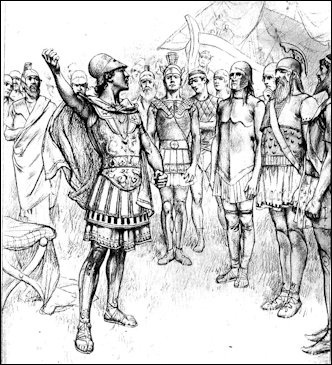
Alexander made a fervent appeal to his comrades to rumours and follow him with “alacrity and confidence.” He declared : “I am not ignorant, soldiers, that during these last days the natives of this country have been spreading all sorts of rumours designed expressly to work upon your fears, but the falsehood of those who invent such lies is nothing new in your experience ”. This assurance was, however, of no avail. The troops persisted in their refusal to enter into further contests with the Indians beyond the Beas, “whose numbers,” so answered Koinos, “though purposely exaggerated by the barbarians, must yet, as I can gather from the lying report itself, be very considerable.” Alexander made his last desperate attempt to rouse the spirit of his soldiers by threatening to march on even if forsaken by them : “Expose me then to the dangers of rivers, to the rage of elephants, and to those nations whose very names fill you with terror. I shall find men that will follow me though I be deserted by you.” [Source: “History of Ancient India” by Rama Shankar Tripathi, Professor of Ancient Indian History and Culture, Benares Hindu University, 1942]
Arrian wrote: “When he heard of this, before the disorder and pusillanimity of the soldiers should advance to a great degree, be called a council of the officers of the brigades and addressed them as follows:—“O Macedonians and Grecian allies, seeing that you no longer follow me into dangerous enterprises with a resolution equal to that which formerly animated you, I have collected you together into the same spot, so that I may either persuade you to march forward with me, or may be persuaded by you to return. If indeed the labours which you have already undergone up to our present position seem to you worthy of disapprobation, and if you do not approve of my leading you into them, there can be no advantage in my speaking any further. But, if as the result of these labours, you hold possession of Ionia, the Hellespont, both the Phrygias, Cappadocia, Paphlagonia, Lydia, Caria, Lycia, Pamphylia, Phoenicia, Egypt together with Grecian Libya, as well as part of Arabia, Hollow Syria, Syria between the rivers, Babylon, the nation of the Susians, Persia, Media, besides all the nations which the Persians and the Medes ruled, and many of those which they did not rule, the land beyond the Caspian Gates, the country beyond the Caucasus, the Tanais, as well as the land beyond that river, Bactria, Hyrcania, and the Hyrcanian Sea; if we have also subdued the Scythians as far as the desert; if, in addition to these, the river Indus flows through our territory, as do also the Hydaspes, the Acesines, and the Hydraotes, why do ye shrink from adding the Hyphasis also, and the nations beyond this river, to your empire of Macedonia? Do ye fear that your advance will be stopped in the future by any other barbarians? Of whom some submit to us of their own accord, and others are captured in the act of fleeing, while others, succeeding in their efforts to escape, hand over to us their deserted land, which we add to that of our allies, or to that of those who have voluntarily submitted to us.” [Source: Arrian the Nicomedian (A.D. 92-175), “Anabasis of Alexander”, translated, by E. J. Chinnock, London: Hodder and Stoughton, 1884, gutenberg.org ]
“I, for my part, think, that to a brave man there is no end to labours except the labours themselves, provided they lead to glorious achievements. But if any one desires to hear what will be the end to the warfare itself, let him learn that the distance still remaining before we reach the river Ganges and the Eastern Sea is not great; and I inform you that the Hyrcanian Sea will be seen to be united with this, because the Great Sea encircles the whole earth. I will also demonstrate both to the Macedonians and to the Grecian allies, that the Indian Gulf is confluent with the Persian, and the Hyrcanian Sea with the Indian Gulf. From the Persian Gulf our expedition will sail round into Libya as far as the Pillars of Heracles. From the pillars all the interior of Libya becomes ours, and so the whole of Asia will belong to us, and the limits of our empire, in that direction, will be those which God has made also the limits of the earth. But, if we now return, many warlike nations are left unconquered beyond the Hyphasis as far as the Eastern Sea, and many besides between these and Hyrcania in the direction of the north wind, and not far from these the Scythian races. [Source: Arrian the Nicomedian (A.D. 92-175), “Anabasis of Alexander”, translated, by E. J. Chinnock, London: Hodder and Stoughton, 1884, gutenberg.org ]
“Wherefore, if we go back, there is reason to fear that the races which are now held in subjection, not being firm in their allegiance, may be excited to revolt by those who are not yet subdued. Then our many labours will prove to have been in vain; or it will be necessary for us to incur over again fresh labours and dangers, as at the beginning. But, O Macedonians and Grecian allies, stand firm! Glorious are the deeds of those who undergo labour and run the risk of danger; and it is delightful to live a life of valour and to die leaving behind immortal glory. Do ye not know that our ancestor reached so great a height of glory as from being a man to become a god, or to seem to become one, not by remaining in Tiryns or Argos, or even in the Peloponnese or at Thebes? The labours of Dionysus were not few, and he was too exalted a deity to be compared with Heracles. But we, indeed, have penetrated into regions beyond Nysa; and the rock of Aornus, which Heracles was unable to capture, is in our possession. Do ye also add the parts of Asia still left unsubdued to those already acquired, the few to the many. But what great or glorious deed could we have performed, if, sitting at ease in Macedonia, we had thought it sufficient to preserve our own country without any labour, simply repelling the attacks of the nations on our frontiers, the Thracians, Illyrians, and Triballians, or even those Greeks who were unfriendly to our interests? If, indeed, without undergoing labour and being free from danger I were acting as your commander, while you were undergoing labour and incurring danger, not without reason would you be growing faint in spirit and resolution, because you alone would be sharing the labours, while procuring the rewards of them for others. But now the labours are common to you and me, we have an equal share of the dangers, and the rewards are open to the free competition of all. For the land is yours, and you act as its viceroys. The greater part also of the money now comes to you; and when we have traversed the whole of Asia, then, by Zeus, not merely having satisfied your expectations, but having even exceeded the advantages which each man hopes to receive, those of you who wish to return home I will send back to their own land, or I will myself lead them back; while those who remain here, I will make objects of envy to those who go back.”
Answer of Coenus
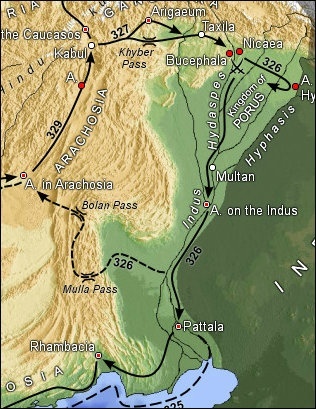
Alexander's route through Pakistan and India to the Arabian Sea
Arrian wrote: “When Alexander had uttered these remarks, and others in the same strain, a long silence ensued, for the auditors neither had the audacity to speak in opposition to the king without constraint, nor did they wish to acquiesce in his proposal. Hereupon, he repeatedly urged any one who wished it, to speak, if he entertained different views from those which he had himself expressed. Nevertheless the silence still continued a long time; but at last, Coenus, son of Polemocrates, plucked up courage and spoke as follows:—“O king, inasmuch as thou dost not wish to rule Macedonians by compulsion, but sayest thou wilt lead them by persuasion, or yielding to their persuasion wilt not use violence towards them, I am going to make a speech, not on my own behalf and that of my colleagues here present, who are held in greater honour than the other soldiers, and most of us have already carried off the rewards of our labours, and from our preeminence are more zealous than the rest to serve thee in all things; but I am going to speak on behalf of the bulk of the army. On behalf of this army I am not going to say what may be gratifying to the men, but what I consider to be both advantageous to thee at present, and safest for the future. [Source: Arrian the Nicomedian (A.D. 92-175), “Anabasis of Alexander”, translated, by E. J. Chinnock, London: Hodder and Stoughton, 1884, gutenberg.org ]
“I feel it incumbent upon me not to conceal what I think the best course to pursue, both on account of my age, the honour paid to me by the rest of the army at thy behest, and the boldness which I have without any hesitation displayed up to the present time in incurring dangers and undergoing labours. The more numerous and the greater the exploits have been, which were achieved by thee as our commander, and by those who started from home with thee, the more advantageous does it seem to me that some end should be put to our labours and dangers. For thou thyself seest how many Macedonians and Greeks started with thee, and how few of us have been left. Of our number thou didst well in sending back home the Thessalians at once from Bactra, because thou didst perceive that they were no longer eager to undergo labours. Of the other Greeks, some have been settled as colonists in the cities which thou hast founded; where they remain not indeed all of them of their own free will. The Macedonian soldiers and the other Greeks who still continued to share our labours and dangers, have either perished in the battles, become unfit for war on account of their wounds, or been left behind in the different parts of Asia. The majority, however, have perished from disease, so that few are left out of many; and these few are no longer equally vigorous in body, while in spirit they are much more exhausted. All those whose parents still survive, feel a great yearning to see them once more; they feel a yearning after their wives and children, and a yearning for their native land itself; which it is surely pardonable for them to yearn to see again with the honour and dignity they have acquired from thee, returning as great men, whereas they departed small, and as rich men instead of being poor.
“Do not lead us now against our will; for thou wilt no longer find us the same men in regard to dangers, since free-will will be wanting to us in the contests. But, rather, if it seem good to thee, return to thy own land, see thy mother, regulate the affairs of the Greeks, and carry to the home of thy fathers these victories so many and great. Then start afresh on another expedition, if thou wishest, against these very tribes of Indians situated towards the east; or, if thou wishest, into the Euxine Sea; or else against Carchedon and the parts of Libya beyond the Carchedonians. It is now thy business to manage these matters; and the other Macedonians and Greeks will follow thee, young men in place of old, fresh men in place of exhausted ones, and men to whom warfare has no terrors, because up to the present time they have had no experience of it; and they will be eager to set out, from hope of future reward. The probability also is, that they will accompany thee with still more zeal on this account, when they see that those who in the earlier expedition shared thy labours and dangers have returned to their own abodes as rich men instead of being poor, and renowned instead of being obscure as they were before. Self-control in the midst of success is the noblest of all virtues, O king! For thou hast nothing to fear from enemies, while thou art commanding and leading such an army as this; but the visitations of the deity are unexpected, and consequently men can take no precautions against them.”
Alexander Resolves to Return
Arrian wrote: “When Coenus had concluded this speech, loud applause was given to his words by those who were present; and the fact that many even shed tears, made it still more evident that they were disinclined to incur further hazards, and that return would be delightful to them. Alexander then broke up the conference, being annoyed at the freedom of speech in which Coenus indulged, and the hesitation displayed by the other officers. But the next day he called the same men together again in wrath, and told them that he intended to advance farther, but would not force any Macedonian to accompany him against his will; that he would have those only who followed their king of their own accord; and that those who wished to return home were at liberty to return and carry back word to their relations that they were come back, having deserted their king in the midst of his enemies. [Source: Arrian the Nicomedian (A.D. 92-175), “Anabasis of Alexander”, translated, by E. J. Chinnock, London: Hodder and Stoughton, 1884, gutenberg.org ]
“Having said this, he retired into his tent, and did not admit any of the Companions on that day, or until the third day from that, waiting to see if any change would occur in the minds of the Macedonians and Grecian allies, as is wont to happen, as a general rule among a crowd of soldiers, rendering them more disposed to obey. But on the contrary, when there was a profound silence throughout the camp, and the soldiers were evidently annoyed at his wrath, without being at all changed by it, Ptolemy, son of Lagus, says that he none the less offered sacrifice there for the passage of the river, but the victims were unfavourable to him when he sacrificed. Then indeed he collected the oldest of the Companions and especially those who were friendly to him, and as all things indicated the advisability of returning, he made known to the army that he had resolved to march back again.”
Alexander Recrosses the Hydraotes and Acesines
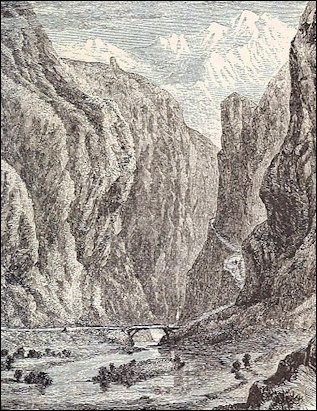
The Macedonian army retreated from the Punjab in September, 326 B.C., . Soon Alexander reached the bank of the Hydaspes (Jhelum), which was the scene of his conflict with Poros. Here Alexander made proper arrangements for keeping the conquered parts of the Punjab under his subjection. [Source: “History of Ancient India” by Rama Shankar Tripathi, Professor of Ancient Indian History and Culture, Benares Hindu University, 1942]
Arrian wrote: “Then they shouted as a mixed multitude would shout when rejoicing; and most of them shed tears of joy. Some of them even approached the royal tent, and prayed for many blessings upon Alexander; because by them alone he suffered himself to be conquered. Then he divided the army into brigades, and ordered twelve altars to be prepared, equal in height to very large towers, and in breadth much larger than towers, to serve as thank-offerings to the gods who had led him so far as a conqueror, and also to serve as monuments of his own labours. When the altars were completed, he offered sacrifice upon them according to his custom, and celebrated a gymnastic and equestrian contest. [Source: Arrian the Nicomedian (A.D. 92-175), “Anabasis of Alexander”, translated, by E. J. Chinnock, London: Hodder and Stoughton, 1884, gutenberg.org ]
“After adding the country as far as the river Hyphasis to the dominion of Porus, he marched back to the Hydraotes. Having crossed this river, he continued his return march to the Acesines, where he found the city which Hephaestion had been ordered to fortify, quite built. In this city be settled as many of the neighbouring people as volunteered to live in it, as well as those of the Grecian mercenaries who were now unfit for military service; and then began to make the necessary preparations for a voyage down the river into the Great Sea. At this time Arsaces, the ruler of the land bordering on that of Abisares, and the brother of the latter, with his other relations, came to Alexander, bringing the gifts which are reckoned most valuable among the Indians, including some elephants from Abisares, thirty in number.
“They declared that Abisares himself was unable to come on account of illness; and with these men the ambassadors sent by Alexander to Abisares agreed. Readily believing that such was the case, he granted that prince the privilege of ruling his own country as his viceroy, and placed Arsaces also under his power. After arranging what tribute they were to pay, he again offered sacrifice near the river Acesines. He then crossed that river again, and came to the Hydaspes, where he employed the army in repairing the damage caused to the cities of Nicaea and Bucephala by the rain, and put the other affairs of the country in order.”
Preparations for a Voyage down the Indus
Alexander then made preparations for sailing down the rivers, but before the voyage actually began he cleared the path of all potential enemies by bringing about the subjugation of Sophytes (Saubhuti ?), whose kingdom had “a mountain of fossil salt which could supply all India.” He was thus the chief of the country of the Salt range. Incidentally, it may be noted that according to Strabo the land of Sophytes had dogs of “astonishing courage” and mettle, and Alexander witnessed their fight oven with a lion. Curtius further avers that the people of Sophytes “excelled in wisdom, and lived under good laws and customs.” Like the Kathaians, they held beauty in great esteem and marriages were contracted not on considerations of high birth but of looks. They examined every infant medically, and if they found “anything deformed or defective in the limbs of a child they ordered it to be killed ” [Source: “History of Ancient India” by Rama Shankar Tripathi, Professor of Ancient Indian History and Culture, Benares Hindu University, 1942]
Plutarch wrote: “Alexander was now eager to see the ocean. To which purpose he caused a great many row-boats and rafts to be built, in which he fell gently down the rivers at his leisure, yet so that his navigation was neither unprofitable nor inactive. For by several descents upon the banks, he made himself master of the fortified towns, and consequently of the country on both sides.[Source: Plutarch (A.D. 45-127), “Life of Alexander”, A.D. 75 translated by John Dryden, 1906, MIT, Online Library of Liberty, oll.libertyfund.org ]
Arrian wrote: “Alexander now resolved to sail down the Hydaspes to the Great Sea, after he had prepared on the banks of that river many thirty-oared galleys and others with one and a half bank of oars, as well as a number of vessels for conveying horses, and all the other things requisite for the easy conveyance of an army on a river. At first he thought he had discovered the origin of the Nile, when he saw crocodiles in the river Indus, which he had seen in no other river except the Nile, as well as beans growing near the banks of the Acesines of the same kind as those which the Egyptian land produces. [Source: Arrian the Nicomedian (A.D. 92-175), “Anabasis of Alexander”, translated, by E. J. Chinnock, London: Hodder and Stoughton, 1884, gutenberg.org ]
“This conjecture was confirmed when he heard that the Acesines falls into the Indus. He thought the Nile rises somewhere or other in India, and after flowing through an extensive tract of desert country loses the name of Indus there; but afterwards when it begins to flow again through the inhabited land, it is called Nile both by the Aethiopians of that district and by the Egyptians, and finally empties itself into the Inner Sea. In like manner Homer made the river Egypt give its name to the country of Egypt. Accordingly when he wrote to Olympias about the country of India, after mentioning other things, he said that he thought he had discovered the sources of the Nile, forming his conclusions about things so great from such small and trivial premisses. However, when he had made a more careful inquiry into the facts relating to the river Indus, he learned the following details from the natives:—That the Hydaspes unites its water with the Acesines, as the latter does with the Indus, and that they both yield up their names to the Indus; that the last-named river has two mouths, through which it discharges itself into the Great Sea; but that it has no connection with the Egyptian country. He then removed from the letter to his mother the part he had written about the Nile. Planning a voyage down the rivers as far as the Great Sea, he ordered ships for this purpose to be prepared for him. The crews of his ships were fully supplied from the Phoenicians, Cyprians, Carians, and Egyptians who accompanied the army.”
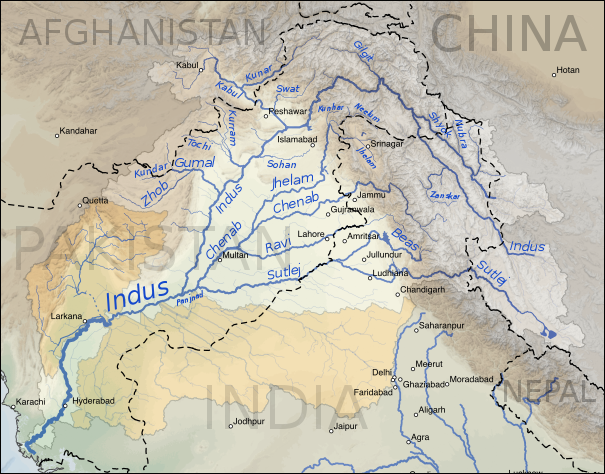
Indus River and it Tributaries, including Hydraotes (Ravi), Acesines (Chenab) and Hydaspes (Jhelum)
Voyage down the Hydaspes
Towards the close of October the signal for departure was given with the sound of the trumpet, and the Macedonian boats glided down the river in grand array, protected on both the banks by troops under the command of Hephsestion and Krateros respectively, until they reached the confluence of the Akesines and the Hydaspes. The army rode down the rivers on the rivers on rafts and stopped to attack and subdue villages along the way. During this trip, Alexander sought out the Indian philosophers, the Brahmins, who were famous for their wisdom, and debated them on philosophical issues. He became legendary for centuries in India for being both a wise philosopher and a fearless conqueror. [Source: “History of Ancient India” by Rama Shankar Tripathi, Professor of Ancient Indian History and Culture, Benares Hindu University, 1942]
Arrian wrote: “At this time Coenus, who was one of Alexander’s most faithful Companions, fell ill and died, and the king buried him with as much magnificence as circumstances allowed. Then collecting the Companions and the Indian envoys who had come to him, he appointed Porus king of the part of India which had already been conquered, seven nations in all, containing more than , cities. After this he made the following distribution of his army. With himself he placed on board the ships all the shield-bearing guards, the archers, the Agrianians, and the body-guard of cavalry. Craterus led a part of the infantry and cavalry along the right bank of the Hydaspes, while along the other bank Hephaestion advanced at the head of the most numerous and efficient part of the army, including the elephants, which now numbered about . [Source: Arrian the Nicomedian (A.D. 92-175), “Anabasis of Alexander”, translated, by E. J. Chinnock, London: Hodder and Stoughton, 1884, gutenberg.org ]
“These generals were ordered to march as quickly as possible to the place where the palace of Sopeithes was situated, and Philip, the viceroy of the country beyond the Indus extending to Bactria, was ordered to follow them with his forces after an interval of three days. He sent the Nysaean cavalry back to Nysa. The whole of the naval force was under the command of Nearchus; but the pilot of Alexander’s ship was Onesicritus, who, in the narrative which he composed of Alexander’s campaigns, falsely asserted that he was admiral, while in reality he was only a pilot. According to Ptolemy, son of Lagus, whose statements I chiefly follow, the entire number of the ships was about eighty thirty-oared galleys; but the whole number of vessels, including the horse transports and boats, and all the other river craft, both those previously plying on the rivers and those built at that time, fell not far short of ,.” “When he had made all the necessary preparations the army began to embark at the approach of the dawn; while according to custom he offered sacrifice to the gods and to the river Hydaspes, as the prophets directed. When he had embarked he poured a libation into the river from the prow of the ship out of a golden goblet, invoking the Acesines as well as the Hydaspes, because he had ascertained that it is the largest of all the rivers which unite with the Hydaspes, and that their confluence was not far off. He also invoked the Indus, into which the Acesines flows after its junction with the Hydaspes. Moreover he poured out libations to his forefather Heracles, to Ammon, and the other gods to whom he was in the habit of sacrificing, and then he ordered the signal for starting seawards to be given with the trumpet. [Source: Arrian the Nicomedian (A.D. 92-175), “Anabasis of Alexander”, translated, by E. J. Chinnock, London: Hodder and Stoughton, 1884, gutenberg.org ]
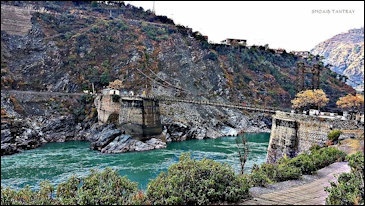
bridge over the Chenan (Acesines) river
“As soon as the signal was given they commenced the voyage in regular order; for directions had been given at what distance apart it was necessary for the baggage vessels to be arranged, as also for the vessels conveying the horses and for the ships of war; so that they might not fall foul of each other by sailing down the channel at random. He did not allow even the fast-sailing ships to get out of rank by outstripping the rest. The noise of the rowing was never equalled on any other occasion, inasmuch as it proceeded from so many ships rowed at the same time; also the shouting of the boatswains giving the time for beginning and stopping the stroke of the oars, and the clamour of the rowers, when keeping time all together with the dashing of the oars, made a noise like a battle-cry. The banks of the river also, being in many places higher than the ships, and collecting the sound into a narrow space, sent back to each other an echo which was very much increased by its very compression. In some parts too the groves of trees on each side of the river helped to swell the sound, both from the solitude and the reverberation of the noise. The horses which were visible on the decks of the transports struck the barbarians who saw them with such surprise that those of them who were present at the starting of the fleet accompanied it a long way from the place of embarkation. For horses had never before been seen on board ships in the country of India; and the natives did not call to mind that the expedition of Dionysus into India was a naval one. The shouting of the rowers and the noise of the rowing were heard by the Indians who had already submitted to Alexander, and these came running down to the river’s bank and accompanied him singing their native songs. For the Indians have been eminently fond of singing and dancing since the time of Dionysus and those who under his bacchic inspiration traversed the land of the Indians with him.”
Voyage down the Hydaspes and Acesines
Arrian wrote: “Sailing thus, he stopped on the third day at the spot where he had instructed Hephaestion and Craterus to encamp on opposite banks of the river at the same place. Here he remained two days, until Philip with the rest of the army came up with him. He then sent this general with the men he brought with him to the river Acesines, with orders to march along the bank of that river. He also sent Craterus and Hephaestion off again with instructions how they were to conduct the march. But he himself continued his voyage down the river Hydaspes, the channel of which is nowhere less than twenty stades broad. Mooring his vessels near the banks wherever he could, he received some of the Indians dwelling near into allegiance by their voluntary surrender, while he reduced by force those who came into a trial of strength with him. [Source: Arrian the Nicomedian (A.D. 92-175), “Anabasis of Alexander”, translated, by E. J. Chinnock, London: Hodder and Stoughton, 1884, gutenberg.org ]
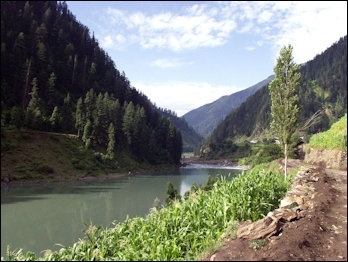
Hydaspes (Jhelum) river
“Then be sailed rapidly towards the country of the Mallians and Oxydracians, having ascertained that these tribes were the most numerous and the most warlike of the Indians in that region; and having been informed that they had put their wives and children for safety into their strongest cities, with the resolution of fighting a battle with him, be made the voyage with the greater speed with the express design of attacking them before they had arranged their plans, and while there was still lack of preparation and a state of confusion among them. Thence he made his second start, and on the fifth day reached the junction of the Hydaspes and Acesines. Where these rivers unite, one very narrow river is formed out of the two; and on account of its narrowness the current is swift. There are also prodigious eddies in the whirling stream, and the water rises in waves and plashes exceedingly, so that the noise of the swell of waters is distinctly heard by people while they are still far off. These things had previously been reported to Alexander by the natives, and be had told his soldiers; and yet, when his army approached the junction of the rivers, the noise made by the stream produced so great an impression upon them that the sailors stopped rowing, not from any word of command, but because the very boatswains who gave the time to the rowers became silent from astonishment and stood aghast at the noise.”
“When they came near the junction of the rivers, the pilots passed on the order that the men should row as hard as possible to get out of the narrows, so that the ships might not fall into the eddies and be overturned by them, but might by the vigorous rowing overcome the whirlings of the water. Being of a round form, the merchant vessels which happened to be whirled round by the current received no damage from the eddy, but the men who were on board were thrown into disorder and fright. For being kept upright by the force of the stream itself, these vessels settled again into the onward course.
“But the ships of war, being long, did not emerge so scatheless from the whirling current, not being raised aloft in the same way as the others upon the plashing swell of water. These ships had two ranks of oars on each side, the lower oars being only a little out of the water. These vessels getting athwart in the eddies, their oars could not be raised aloft in proper time and were consequently caught by the water and came into collision with each other. Thus many of the ships were damaged; two indeed fell foul of each other and were destroyed, and many of those sailing in them perished. But when the river widened out, there the current was no longer so rapid, and the eddies did not whirl round with so much violence. Alexander therefore moored his fleet on the right bank, where there was a protection from the force of the stream and a roadstead for the ships. A certain promontory also in the river jutted out conveniently for collecting the wrecks. He preserved the lives of the men who were still being conveyed upon them; and when he had repaired the damaged ships, he ordered Nearchus to sail down the river until he reached the confines of the nation called Mallians.
“He himself made an inroad into the territories of the barbarians who would not yield to him, and after preventing them from succouring the Mallians, he again formed a junction with the naval armament. Hephaestion, Craterus, and Philip had already united their forces here. Alexander then transported the elephants, the brigade of Polysperchon, the horse-archers, and Philip with his army, across the river Hydaspes, and instructed Craterus to lead them. He sent Nearchus with the fleet with orders to set sail three days before the army started. He divided the rest of his army into three parts, and ordered Hephaestion to go five days in advance, so that if any should flee before the men under his own command and go rapidly forward they might fall in with Hephaestion’s brigade and thus be captured. He also gave a part of the army to Ptolemy, son of Lagus, with orders to follow him after the lapse of three days, so that all those who fled from him and turned back again might fall in with Ptolemy’s brigade. He ordered those in advance to wait, when they arrived at the confluence of the rivers Acesines and Hydraotes, until he himself came up; and he instructed Craterus and Ptolemy also to form a junction with him at the same place.”
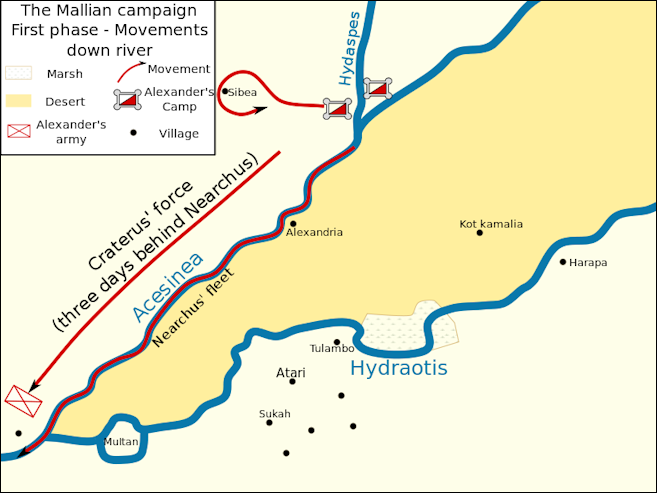
Campaign against the Mallians
The Mallians were said to be one of the most warlike of the Indian tribes. Alexander was wounded several times in this attack, most seriously when an arrow pierced his breastplate and his ribcage. The Macedonian officers rescued him in a narrow escape from the village. [Source: Worldmark Encyclopedia of Nations, Thomson Gale, 2007]
Arrian wrote: “He then took the shield-bearing guards, the bowmen, the Agrianians, Peithon’s brigade of men, who were called foot Companions, all the horse bowmen and half the cavalry Companions, and marched through a tract of country destitute of water against the Mallians, a tribe of the independent Indians. On the first day he encamped near a small piece of water which was about stades distant from the river Acesines. Having dined there and caused his army to rest a short time, he ordered every man to fill whatever vessel he had with water. After travelling the remaining part of that day and all the ensuing night a distance of about stades, he at daybreak reached the city into which many of the Mallians had fled for refuge. Most of them were outside the city and unarmed, supposing that Alexander would never come against them through the waterless country. [Source: Arrian the Nicomedian (A.D. 92-175), “Anabasis of Alexander”, translated, by E. J. Chinnock, London: Hodder and Stoughton, 1884, gutenberg.org ]
“It was evident that he led his army by this route for this very reason, because it was difficult to lead an army this way, and consequently it appeared incredible to the enemy that he would lead his forces in this direction. He therefore fell upon them unexpectedly, and killed most of them without their even turning to defend themselves, since they were unarmed. He cooped the rest up in the city, and posted his cavalry all round the wall, because the phalanx of infantry had not yet come up with him. He thus made use of his cavalry in place of a stockade. As soon as the infantry arrived, he sent Perdiccas with his own cavalry regiment and that of Clitus, as well as the Agrianians, against another city of the Mallians, whither many of the Indians of that region had fled for refuge. He ordered Perdiccas to blockade the men in the city, but not to commence the action until he himself should arrive, so that none might escape from this city and carry news to the rest of the barbarians that Alexander was already approaching. He then began to assault the wall; but the barbarians abandoned it, finding that they were no longer able to defend it, since many had been killed in the capture, and others had been rendered unfit for fighting on account of their wounds. Fleeing for refuge into the citadel, they defended themselves for some time from a position commanding from its height and difficult of access. But as the Macedonians pressed on vigorously from all sides, and Alexander himself appeared now in this part of the action and now in that, the citadel was taken by storm, and all the men who had fled into it for refuge were killed, to the number of ,. Perdiccas also reached the city to which he had been despatched and found it deserted; but learning that the inhabitants had fled from it not long before, he made a forced march on the track of the fugitives. The light-armed troops followed him as quickly as they could on foot, so that he took and massacred as many of the fugitives as could not outstrip him and flee for safety into the river-marshes.”
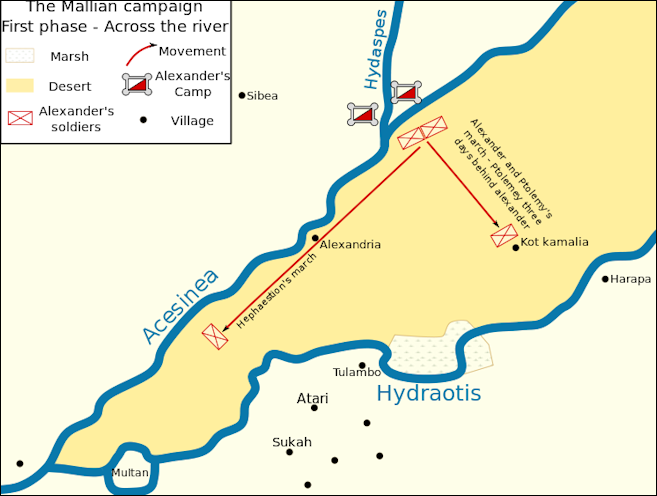
“After dining and causing his men to rest until the first watch of the night, Alexander marched forward; and travelling a great distance through the night, he arrived at the river Hydraotes at daybreak. There he ascertained that most of the Mallians had already crossed the river; but coming upon those who were still in the act of crossing, he slew many of them in their passage. Having crossed with them in pursuit without any delay by the same ford, he kept close up with those who had outstripped him in their retreat.
“Many also of these he slew; some he took prisoners; but the majority of them escaped into a place strong by nature and made more so by fortifications. When the infantry reached him, Alexander despatched Peithon against the men in the fortress, giving him the command of his own brigade of infantry and two regiments of cavalry. These, attacking the place, took it at the first assault, and made slaves of all those who had fled thither for safety, at least as many of them as had not perished in the attack. After accomplishing this, Peithon returned again to the camp. Alexander in person led his forces against a certain city of the Brachmans, because he ascertained that some of the Mallians had fled for refuge into it. When he reached it, he led his phalanx in serried ranks close up to the wall on all sides. The enemy seeing that their walls were being undermined, and being themselves repulsed by the missiles, abandoned the walls, and having fled for safety into the citadel, began to defend themselves from thence. A few Macedonians having rushed in with them, turning round and drawing together into a close body, drove some of them back and killed five-and-twenty of them in their retreat. Hereupon Alexander ordered the scaling-ladders to be placed against the citadel on all sides, and the wall to be undermined; and when one of the towers, being undermined, fell down, and a part of the wall between two towers was breached, and thus rendered the citadel more accessible to assault in this quarter, he was seen to be the first man to scale the wall and get hold of it. The other Macedonians seeing him were ashamed of themselves and mounted the ladders in various places. The citadel was soon in their possession. Some of the Indians began to set fire to the houses, and being caught in them were killed; but most of them were slain fighting. About , in all were killed; and on account of their valour, only a few were taken prisoners.”
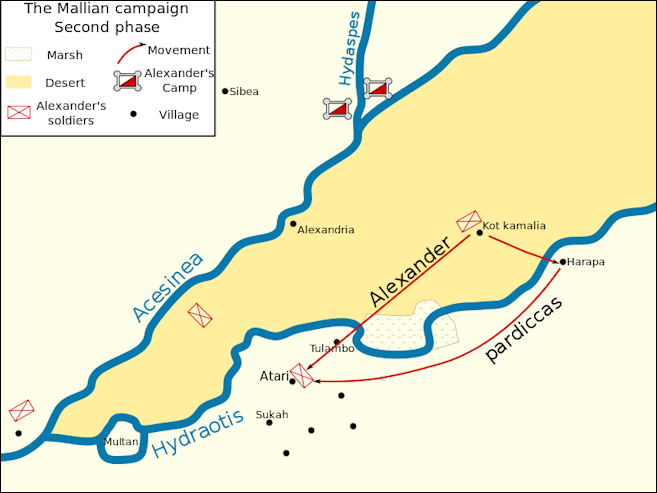
Defeat of the Mallians at the River Hydraotes
Arrian wrote: “Having remained there one day to give his army rest, he advanced on the morrow against the other Mallians. He found the cities abandoned, and ascertained that the men had fled into the desert. There he again gave the army one day’s rest, and on the next day sent Peithon and Demetrius the cavalry general back to the river, in command of their own troops, giving them in addition as many battalions of the light-armed infantry as were sufficient for the enterprise. Their instructions were to go along the bank of the river, and if they met any of those who had fled for safety into the woods, of which there were many near the river’s bank, to kill all who refused to surrender. Peithon and Demetrius captured many of these in the woods and killed them. He himself led his forces against the largest city of the Mallians, whither he was informed many from the other cities had taken refuge. [Source: Arrian the Nicomedian (A.D. 92-175), “Anabasis of Alexander”, translated, by E. J. Chinnock, London: Hodder and Stoughton, 1884, gutenberg.org ]
“But this also the Indians abandoned when they heard that Alexander was marching against it. Crossing the river Hydraotes, they remained with their forces drawn up upon its bank, because it was high, and they thought they could obstruct Alexander’s passage. When he heard this, he took all the cavalry which he had with him, and went to the part of the river where he was informed that the Mallians had drawn themselves up for battle; and the infantry was ordered to follow. When he reached the river and beheld the enemy drawn up on the opposite bank, he made no delay, but instantly plunged into the ford with the cavalry alone. When they saw that he was now in the middle of the river, though they were drawn up ready for battle, they withdrew from the bank with all speed; and Alexander followed them with his cavalry alone. But when the Indians perceived only cavalry, they wheeled round and fought with desperate valour, being about , in number. When Alexander perceived that their phalanx was densely compact, and that his own infantry was absent, he rode right round their army and made charges upon them, but did not come to close fighting with them. Meanwhile the archers, the Agrianians and the other battalions of light-armed infantry, being picked men whom he was leading with him, arrived, and his phalanx of infantry was seen not far off. As all kinds of danger were threatening them at once, the Indians now wheeled round again and began to flee with headlong speed into the strongest of their adjacent cities; but Alexander followed them and slew many, while those who escaped into the city were cooped up within it. At first indeed he surrounded the city with the horse-soldiers as they came up from the march; but when the infantry arrived, he encamped all round the wall for this day, because not much of it was left for making the assault, and his army had been exhausted, the infantry by the long march, and the cavalry by the uninterrupted pursuit, and especially by the passage of the river.”
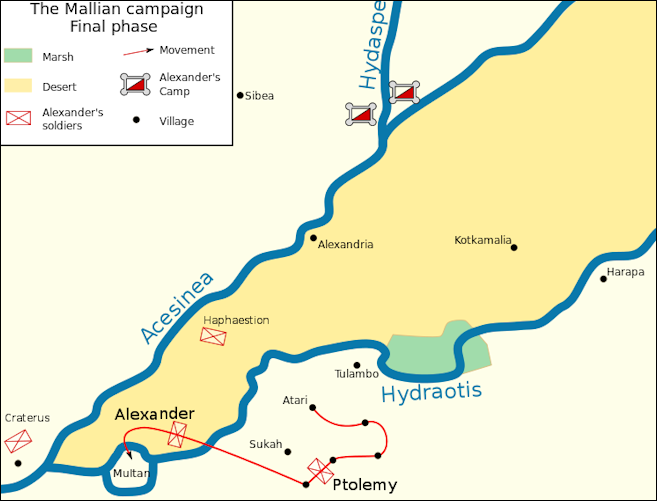
Storming of the Mallian Stronghold
Arrian wrote: “On the following day, dividing the army into two parts, he himself assaulted the wall at the head of one, and Perdiccas led on the other. Upon this the Indians did not wait to receive the attack of the Macedonians, but abandoned the walls of the city and fled for safety into the citadel. Alexander and his troops therefore split open a small gate, and got within the city long before the others; for those who had been put under Perdiccas were behind time, having experienced difficulty in scaling the walls, as most of them did not bring ladders, thinking that the city had been captured, when they observed that the walls were deserted by the defenders. [Source: Arrian the Nicomedian (A.D. 92-175), “Anabasis of Alexander”, translated, by E. J. Chinnock, London: Hodder and Stoughton, 1884, gutenberg.org ]
“But when the citadel was seen to be still in the possession of the enemy, and many of them were observed drawn up in front of it to repel attacks, some of the Macedonians tried to force an entry by undermining the wall, and others by placing scaling ladders against it, wherever it was practicable to do so. Alexander, thinking that the men who carried the ladders were too slow, snatched one from a man who was carrying it, placed it against the wall, and began to mount it, crouching under his shield. After him mounted Peucestas, the man who carried the sacred shield which Alexander took from the temple of the Trojan Athena and used to keep with him, and have it carried before him in all his battles. After Peucestas, by the same ladder ascended Leonnatus the confidential body-guard; and up another ladder went Abreas, one of the soldiers who received double pay for distinguished services. The king was now near the battlement of the wall, and leaning his shield against it was pushing some of the Indians within the fort, and had cleared that part of the wall, by killing others with his sword. The shield-bearing guards becoming very anxious for the king’s safety, pushed each other with ardour up the same ladder and broke it; so that those who were already mounting fell down and made the ascent impracticable for the rest. Alexander then, standing upon the wall, was being assailed all round from the adjacent towers; for none of the Indians dared approach him. He was also being assailed by the men in the city, who were throwing darts at him from no great distance; for a mound of earth happened to have been heaped up there opposite the wall.
“Alexander was conspicuous both by the brightness of his weapons and by his extraordinary display of audacity. He therefore perceived that if he remained where he was, he would be incurring danger without being able to perform anything at all worthy of consideration; but if he leaped down within the fort he might perhaps by this very act strike the Indians with terror, and if he did not, but should only thereby be incurring danger, at any rate he would die not ignobly after performing great deeds of valour worthy of recollection by men of after times. Forming this resolution, he leaped down from the wall into the citadel; where, supporting himself against the wall, he struck with his sword and killed some of the Indians who came to close quarters with him, including their leader, who rushed upon him too boldly. Another man who approached him he kept in check by hurling a stone at him, and a third in like manner. Those who advanced nearer to him he again kept off with his sword; so that the barbarians were no longer willing to approach him, but standing round him cast at him from all sides whatever any one happened to have or could get hold of at the time.”
Alexander Dangerously Wounded
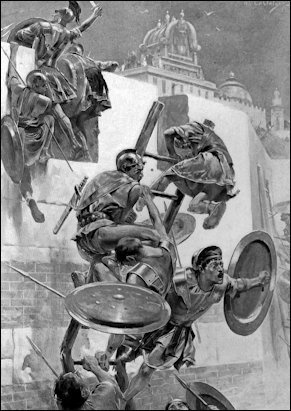
the ladder breaks stranding Alexander and some companions within the Mallian town
Plutarch wrote: “At a siege of a town of the Mallians, who have the repute of being the bravest people of India, he ran in great danger of his life. For having beaten off the defendants with showers of arrows, he was the first man that mounted the wall by a scaling ladder, which, as soon as he was up, broke and left him almost alone, exposed to the darts which the barbarians threw at him in great numbers from below. [Source: Plutarch (A.D. 45-127), “Life of Alexander”, A.D. 75 translated by John Dryden, 1906, MIT, Online Library of Liberty, oll.libertyfund.org ]
“In this distress, turning himself as well as he could, he leaped down in the midst of his enemies, and had the good fortune to light upon his feet. The brightness and clattering of his armor when he came to the ground, made the barbarians think they saw rays of light, or some bright phantom playing before his body, which frightened them so at first, that they ran away and dispersed. Till seeing him seconded but by two of his guards, they fell upon him hand to hand, and some, while he bravely defended himself, tried to wound him through his armor with their swords and spears. And one who stood further off, drew a bow with such just strength, that the arrow finding its way through his cuirass, stuck in his ribs under the breast. This stroke was so violent, that it made him give back, and set one knee to the ground, upon which the man ran up with his drawn scimitar, thinking to despatch him, and had done it, if Peucestes and Limnæus had not interposed, who were both wounded, Limnæus mortally, but Peucestes stood his ground, while Alexander killed the barbarian. But this did not free him from danger; for besides many other wounds, at last he received so weighty a stroke of a club upon his neck, that he was forced to lean his body against the wall, still, however, facing the enemy. At this extremity, the Macedonians made their way in and gathered round him.”
On the same Arrian wrote: “Peucestas and Abreas, the soldier entitled to double pay, and after them Leonnatus, being the only men who happened to have scaled the wall before the ladders were broken, had leaped down and were fighting in front of the king. Abreas, the man entitled to double pay, fell there, being shot with an arrow in the forehead. Alexander himself also was wounded with an arrow under the breast through his breastplate into the chest, so that Ptolemy says air was breathed out from the wound together with the blood. But although he was faint with exhaustion, he defended himself, as long as his blood was still warm. But the blood streaming out copiously and without ceasing at every expiration of breath, he was seized with a dizziness and swooning, and bending over fell upon his shield. [Source: Arrian the Nicomedian (A.D. 92-175), “Anabasis of Alexander”, translated, by E. J. Chinnock, London: Hodder and Stoughton, 1884, gutenberg.org ]
“After he had fallen Peucestas defended him, holding over him in front the sacred shield brought from Troy; and on the other side he was defended by Leonnatus. But both these men were themselves wounded, and Alexander was now nearly fainting away from loss of blood. For the Macedonians had experienced great difficulty in the assault also on this account, because those who saw Alexander being shot at upon the wall and then leaping down into the citadel within, in their ardour arising from fear lest their king should meet with any mishap by recklessly exposing himself to danger, broke the ladders.
“Then some began to devise one plan and others another to mount upon the wall, as well as they could in their state of embarrassment, some fixing pegs into the wall, which was made of earth, and suspending themselves from these hoisted themselves up with difficulty by their means; others got up by mounting one upon the other. The first man who got up threw himself down from the wall into the city, and so on in succession; and when they saw the king lying there on the ground they all raised a loud lamentation and howl of grief. Now ensued a desperate conflict around his fallen body, one Macedonian after another holding his shield in front of him. In the meantime some of the soldiers having shivered in pieces the bar by which the gate in the space of wall between the towers was secured, entered the city a few at the time; while others, inasmuch as a gap had been made in the gate, put their shoulders under it and forced it into the space inside the wall, and thus laid the citadel open in that quarter.”
“Hereupon some of them began to kill the Indians, all of whom they slew, sparing not even a woman or child...Many other things concerning this catastrophe have been recorded by the historians; and Rumour having received the statements as they were given by the first falsifiers of the facts, still preserves them even to our times, nor will she desist from handing the falsehoods on to others also in regular succession, unless a stop is put to it by this history. For example, the common account is, that this calamity befell Alexander among the Oxydracians; whereas, it really occurred among the Mallians, an independent tribe of Indians; the city belonged to the Mallians, and the men who wounded him were Mallians. These people, indeed, had resolved to join their forces with the Oxydracians and then to make a desperate struggle; but he forestalled them by marching against them through the waterless country, before any aid could reach them from the Oxydracians, or they could render any help to the latter.
Alexander Recovers While His Soldiers Worry
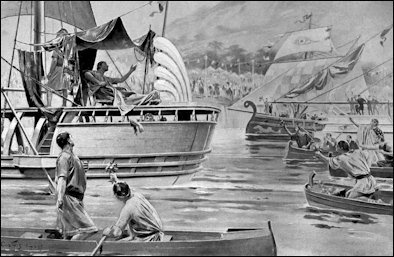
Wounded Alexander passing through his fleet in India
Arrian wrote: Others carried off the king, who was lying in a faint condition, upon his shield; and they could not yet tell whether he was likely to survive. Some authors have stated that Critodemus, a physician of Cos, an Asclepiad by birth, made an incision into the injured part and drew the weapon out of the wound. Other authors say that as there was no physician present at the critical moment, Perdiccas, the confidential body-guard, at Alexander’s bidding, made an incision with his sword into the wounded part and removed the weapon. On its removal there was such a copious effusion of blood that Alexander swooned again; and the effect of the swoon was, that the effusion of blood was stanched. [Source: Arrian the Nicomedian (A.D. 92-175), “Anabasis of Alexander”, translated, by E. J. Chinnock, London: Hodder and Stoughton, 1884, gutenberg.org ]
Plutarch wrote: “They took him up, just as he was fainting away, having lost all sense of what was done near him, and conveyed him to his tent, upon which it was presently reported all over the camp that he was dead. But when they had with great difficulty and pains sawed off the shaft of the arrow, which was of wood, and so with much trouble got] off his cuirass, they came to cut out the head of it, which was three fingers broad and four long, and stuck fast in the bone. During the operation, he was taken with almost mortal swoonings, but when it was out he came to himself again. Yet though all danger was past, he continued very weak, and confined himself a great while to a regular diet and the method of his cure, till one day hearing the Macedonians clamoring outside in their eagerness to see him, he took his cloak and went out. And having sacrificed to the gods, without more delay he went on board again, and as he coasted along, subdued a great deal of the country on both sides, and several considerable cities.[Source: Plutarch (A.D. 45-127), “Life of Alexander”, A.D. 75 translated by John Dryden, 1906, MIT, Online Library of Liberty, oll.libertyfund.org ]
Arian wrote: “While Alexander was remaining in this place until his wound was cured, the first news which reached the camp from which he had set out to attack the Mallians was that he had died of the wound; and at first there arose a sound of lamentation from the entire army, as one man handed the rumour on to another. When they ceased their lamentation, they became spiritless, and felt perplexed as to the man who was to become the leader of the army; for many of the officers seemed to have stood in equal rank and merit, both in the opinion of Alexander and in that of the Macedonians.
“They were also in a state of perplexity how to get back in safety to their own country, being quite enclosed by so many warlike nations, some of whom had not yet submitted, and who they conjectured would fight stoutly for their freedom; while others would no doubt revolt as soon as they were relieved of their fear of Alexander. Besides, they seemed at that time to be in the midst of impassable rivers, and all things appeared to them uncertain and impracticable now that they were bereft of Alexander. But when at length the news came that he was still alive, they with difficulty acquiesced in it; and did not yet believe that he was likely to survive. Even when a letter came from the king, saying that he was coming down to the camp in a short time, this did not appear to most of them worthy of credit, on account of their excessive fear; for they conjectured that the letter was concocted by his confidential body-guards and generals.”
Joy of the Soldiers at Alexander’s Recovery
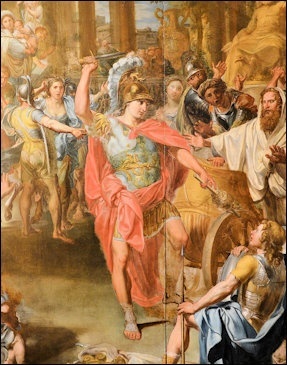
Arrian wrote: “When Alexander became acquainted with this, for fear some attempt at a revolution might be made in the army, he had himself conveyed, as soon as it could be done with safety, to the bank of the river Hydraotes, and placed in a boat to sail down the river. For the camp was at the confluence of the Hydraotes and Acesines, where Hephaestion was at the head of the army, and Nearchus of the fleet. When the ship bearing the king approached the camp, he ordered the tent covering to be removed from the stern, that he might be visible to all. But they were still incredulous, thinking, forsooth, that Alexander’s corpse was being conveyed on the vessel; until at length he stretched out his hand to the multitude, when the ship was nearing the bank. [Source: Arrian the Nicomedian (A.D. 92-175), “Anabasis of Alexander”, translated, by E. J. Chinnock, London: Hodder and Stoughton, 1884, gutenberg.org ]
“Then the men raised a cheer, lifting their hands, some towards the sky and others to the king himself. Many even shed involuntary tears at the unexpected sight. Some of the shield-bearing guards brought a litter for him when he was conveyed out of the ship; but he ordered them to fetch his horse. When he was seen again mounting his horse, the whole army re-echoed with loud clapping of hands, so that the banks of the river and the groves near them reverberated with the sound. On approaching his tent he dismounted from his horse, so that he might be seen walking. Then the men came near, some on one side, others on the other, some touching his hands, others his knees, others only his clothes. Some only came close to get a sight of him, and went away having chanted his praise, while others threw garlands upon him, or the flowers which the country of India supplied at that season of the year.
“Nearchus says that some of his friends incurred his displeasure, reproaching him for exposing himself to danger in the front of the army in battle; which they said was the duty of a private soldier, and not that of the general. It seems to me that Alexander was offended at these remarks, because be knew that they were correct, and that he deserved the censure. However, like those who are mastered by any other pleasure, he had not sufficient self-control to keep aloof from danger, through his impetuosity in battle and his passion for glory. Nearchus also says that a certain old Boeotian, whose name he does not mention, perceiving that Alexander was offended at the censures of his friends and was looking sullenly at them, came near him, and speaking in the Boeotian dialect, said: “O Alexander, it is the part of heroes to perform great deeds!” and repeated a certain Iambic verse, the purport of which is, that the man who performs anything great is destined also to suffer. This man was not only acceptable to Alexander at the time, but was afterwards received into his more intimate acquaintance.”
Voyage down the Hydraotes and Acesines into the Indus
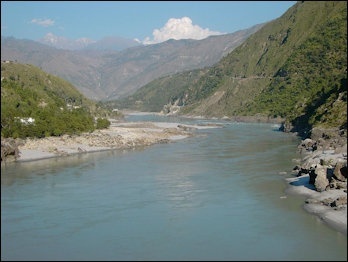
Indus River
Arrian wrote: “At this time arrived envoys from the Mallians who still survived, offering the submission of the nation; also from the Oxydracians came both the leaders of the cities and the governors of the provinces, accompanied by the other most notable men, with full powers to make a treaty, bringing the gifts which are considered most valuable among the Indians, and also, like the Mallians, offering the submission of their nation. They said that their error in not having sent an embassy to him before was pardonable, because they excelled other races in the desire to be free and independent, and their freedom had been secure from the time Dionysus came into India until Alexander came; but if it seemed good to him, inasmuch as there was a general report that he also was sprung from gods, they were willing to receive whatever viceroy he might appoint, pay the tribute decreed by him, and give him as many hostages as he might demand. [Source: Arrian the Nicomedian (A.D. 92-175), “Anabasis of Alexander”, translated, by E. J. Chinnock, London: Hodder and Stoughton, 1884, gutenberg.org ]
“He therefore demanded the thousand best men of the nation, whom he might hold as hostages, if he pleased; and if not, that he might keep them as soldiers in his army, until he had finished the war which he was waging against the other Indians. They accordingly selected the thousand best and tallest men of their number, and sent them to him, together with chariots and charioteers, though these were not demanded. Alexander appointed Philip viceroy over these people and the Mallians who were still surviving. He sent back the hostages to them, but retained the chariots. When he had satisfactorily arranged these matters, since many vessels had been built during the delay arising from his being wounded, he embarked , of the cavalry Companions, as many of the light-armed troops as before, and , infantry, and sailed a short distance down the river Hydraotes. But when that river mingled its waters with the Acesines, the latter giving its name to the united stream, he continued his voyage down the Acesines, until he reached its junction with the Indus. For these four large rivers, which are all navigable, discharge their water into the river Indus, though each does not retain its distinct name. For the Hydaspes discharges itself into the Acesines, and after the junction the whole stream forms what is called the Acesines. Again this same river unites with the Hydraotes, and after absorbing this river, still retains its own name. After this the Acesines takes in the Hyphasis, and finally flows into the Indus under its own name; but after the junction it yields its name to the Indus. From this point I have no doubt that the Indus proceeds stades, and perhaps more, before it is divided so as to form the Delta; and there it spreads out more like a lake than a river.”
Voyage down the Indus to the Land of Musicanus
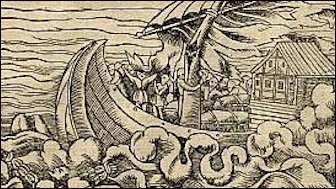
Arrian wrote: “There, at the confluence of the Acesines and Indus, he waited until Perdiccas with the army arrived, after having routed on his way the independent tribe of the Abastanians. Meantime, he was joined by other thirty-oared galleys and trading vessels which had been built for him among the Xathrians, another independent tribe of Indians who had yielded to him. From the Ossadians, who were also an independent tribe of Indians, came envoys to offer the submission of their nation. Having fixed the confluence of the Acesines and Indus as the limit of Philip’s viceroyalty, he left with him all the Thracians and as many men from the infantry regiments as appeared to him sufficient to provide for the security of the country. He then ordered a city to be founded there at the very junction of the two rivers, expecting that it would become large and famous among men. [Source: Arrian the Nicomedian (A.D. 92-175), “Anabasis of Alexander”, translated, by E. J. Chinnock, London: Hodder and Stoughton, 1884, gutenberg.org ]
“He also ordered a dockyard to be made there. At this time the Bactrian Oxyartes, father of his wife Roxana, came to him, to whom he gave the viceroyalty over the Parapamisadians, after dismissing the former viceroy, Tiryaspes, because he was reported to be exercising his authority improperly. Then he transported Craterus with the main body of the army and the elephants to the left bank of the river Indus, both because it seemed easier for a heavy-armed force to march along that side of the river, and the tribes dwelling near were not quite friendly. He himself sailed down to the capital of the Sogdians; where he fortified another city, made another dockyard, and repaired his shattered vessels. He appointed Oxyartes viceroy, and Peithon general of the land extending from the confluence of the Indus and Acesines as far as the sea, together with all the coastland of India. He then again despatched Craterus with his army through the country of the Arachotians and Drangians; and himself sailed down the river into the dominions of Musicanus, which was reported to be the most prosperous part of India.
“He advanced against this king because he had not yet come to meet him to offer the submission of himself and his land, nor had he sent envoys to seek his alliance. He had not even sent him the gifts which were suitable for a great king, or asked any favour from him. He accelerated his voyage down the river to such a degree that he succeeded in reaching the confines of the land of Musicanus before he had even heard that Alexander had started against him. Musicanus was so greatly alarmed that he went as fast as he could to meet him, bringing with him the gifts valued most highly among the Indians, and taking all his elephants. He offered to surrender both his nation and himself, at the same time acknowledging his error, which was the most effectual way with Alexander for any one to get what he requested. Accordingly for these considerations Alexander granted him an indemnity for his offences. He also granted him the privilege of ruling the city and country, both of which Alexander admired. Craterus was directed to fortify the citadel in the capital; which was done while Alexander was still present. A garrison was also placed in it, because he thought the place suitable for keeping the circumjacent tribes in subjection.”
Indian Philosophers
Plutarch wrote: “In this voyage, he took ten of the Indian philosophers prisoners, who had been most active in persuading Sabbas to revolt, and had caused the Macedonians a great deal of trouble. These men, called Gymnosophists, were reputed to be extremely ready and succinct in their answers, which he made trial of, by putting difficult questions to them, letting them know that those whose answers were not pertinent, should be put to death, of which he made the eldest of them judge. The first being asked which he thought most numerous, the dead or the living, answered, “The living, because those who are dead are not at all.” Of the second, he desired to know whether the earth or the sea produced the largest beast; who told him, “The earth, for the sea is but a part of it.” His question to the third was, Which is the cunningest of beasts? “That,” said he, “which men have not yet found out.” He bade the fourth tell him what argument he used to Sabbas to persuade him to revolt. “No other,” said he, “than that he should either live or die nobly.” Of the fifth he asked, Which was eldest, night or day? The philosopher replied, “Day was eldest, by one day at least.” [Source: Plutarch (A.D. 45-127), “Life of Alexander”, A.D. 75 translated by John Dryden, 1906, MIT, Online Library of Liberty, oll.libertyfund.org ]
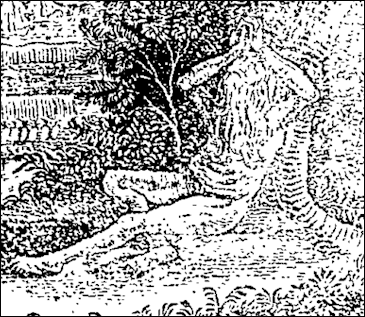
“But perceiving Alexander not well satisfied with that account, he added, that he ought not to wonder if strange questions had as strange answers made to them. Then he went on and inquired of the next, what a man should do to be exceedingly beloved. “He must be very powerful,” said he, “without making himself too much feared.” The answer of the seventh to his question, how a man might become a god, was, “By doing that which was impossible for men to do.” The eighth told him, “Life is stronger than death, because it supports so many miseries.” And the last being asked, how long he thought it decent for a man to live, said, “Till death appeared more desirable than life.” Then Alexander turned to him whom he had made judge, and commanded him to give sentence. “All that I can determine,” said he, “is, that they have every one answered worse than another.” “Nay,” said the king, “then you shall die first, for giving such a sentence.” “Not so, O king,” replied the gymnosophist, “unless you said falsely that he should die first who made the worst answer.” In conclusion he gave them presents and dismissed them.
“But to those who were in greatest reputation among them, and lived a private quiet life, he sent Onesicritus, one of Diogenes the Cynic’s disciples, desiring them to come to him. Calanus, it is said, very arrogantly and roughly commanded him to strip himself, and hear what he said, naked, otherwise he would not speak a word to him, though he came from Jupiter himself. But Dandamis received him with more civility, and hearing him discourse of Socrates, Pythagoras, and Diogenes, told him he thought them men of great parts, and to have erred in nothing so much, as in having too great respect for the laws and customs of their country. Others say, Dandamis only asked him the reason why Alexander undertook so long a journey to come into those parts. Taxiles, however, persuaded Calanus to wait upon Alexander. [243] His proper name was Sphines, but because he was wont to say Cale, which in the Indian tongue is a form of salutation, to those he met with anywhere, the Greeks called him Calanus. He is said to have shown Alexander an instructive emblem of government, which was this. He threw a dry shrivelled hide upon the ground, and trod upon the edges of it. The skin when it was pressed in one place, still rose up in another, wheresoever he trod round about it, till he set his foot in the middle, which made all the parts lie even and quiet. The meaning of this similitude being that he ought to reside most in the middle of his empire, and not spend too much time on the borders of it.”
Campaign against Oxycanus and Sambus
Arrian wrote: “Then he took the archers, Agrianians, and cavalry sailing with him, and marched against the governor of that country, whose name was Oxycanus, because he neither came himself nor did envoys come from him, to offer the surrender of himself and his land. At the very first assault he took by storm the two largest cities under the rule of Oxycanus; in the second of which that prince himself was captured. The booty he gave to his army, but the elephants he led with himself. The other cities in the same land surrendered to him as he advanced, nor did any one turn to resist him; so cowed in spirit had all the Indians now become at the thought of Alexander and his fortune. [Source: Arrian the Nicomedian (A.D. 92-175), “Anabasis of Alexander”, translated, by E. J. Chinnock, London: Hodder and Stoughton, 1884, gutenberg.org ]
“He then marched back against Sambus, whom he had appointed viceroy of the mountaineer Indians and who was reported to have fled, because he learned that Musicanus had been pardoned by Alexander and was ruling over his own land. For he was at war with Musicanus. But when Alexander approached the city which the country of Sambus held as its metropolis, the name of which was Sindimana, the gates were thrown open to him at his approach, and the relations of Sambus reckoned up his money and went out to meet him, taking with them the elephants also. They assured him that Sambus had fled, not from any hostile feeling towards Alexander, but fearing on account of the pardon of Musicanus. He also captured another city which had revolted at this time, and slew as many of the Brachmans as had been instigators of this revolt. These men are the philosophers of the Indians, of whose philosophy, if such it may be called, I shall give an account in my book descriptive of India.”
Musicanus Executed, Capture of Patala
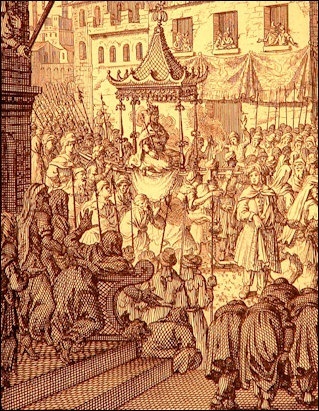
Opulence of the Indian kings
Arrian wrote: “Meantime he was informed that Musicanus had revolted. He despatched the viceroy, Peithon, son of Agenor, with a sufficient army against him, while he himself marched against the cities which had been put under the rule of Musicanus. Some of these he razed to the ground, reducing the inhabitants to slavery; and into others he introduced garrisons and fortified the citadels. After accomplishing this, be returned to the camp and fleet. By this time Musicanus had been captured by Peithon, who was bringing him to Alexander. [Source: Arrian the Nicomedian (A.D. 92-175), “Anabasis of Alexander”, translated, by E. J. Chinnock, London: Hodder and Stoughton, 1884, gutenberg.org ]
“The king ordered him to be hanged in his own country, and with him as many of the Brachmans as had instigated him to the revolt. Then came to him the ruler of the land of the Patalians, who said that the Delta formed by the river Indus was still larger than the Egyptian Delta. This man surrendered to him the whole of his own land and entrusted both himself and his property to him. Alexander sent him away again in possession of his own dominions, with instructions to provide whatever was needful for the reception of the army. He then sent Craterus into Carmania with the brigades of Attalus, Meleager, and Antigenes, some of the archers, and as many of the Companions and other Macedonians as, being now unfit for military service, he was despatching to Macedonia by the route through the lands of the Arachotians and Zarangians. To Craterus he also gave the duty of leading the elephants; but the rest of the army, except the part of it which was sailing with himself down to the sea, he put under the command of Hephaestion. He transported Peithon with the cavalry-lancers and Agrianians to the opposite bank of the Indus, not the one along which Hephaestion was about to lead the army.
“Peithon was ordered to collect men to colonize the cities which had just been fortified, and to form a junction with the king at Patala, after having settled the affairs of the Indians of that region, if they attempted any revolutionary proceedings. On the third day of his voyage, Alexander was informed that the governor of the Patalians had collected most of his subjects and was going away by stealth, having left his land deserted. For this reason Alexander sailed down the river with greater speed than before; and when he arrived at Patala, he found both the country and the city deserted by the inhabitants and tillers of the soil. He however despatched the lightest troops in his army in pursuit of the fugitives; and when some of them were captured, he sent them away to the rest, bidding them be of good courage and return, for they might inhabit the city and till the country as before. Most of them accordingly returned.”
Voyage down the Indus
Arrian wrote: “After instructing Hephaestion to fortify the citadel in Patala, he sent men into the adjacent country, which was waterless, to dig wells and to render the land fit for habitation. Certain of the native barbarians attacked these men, and falling upon them unawares slew some of them; but having lost many of their own men, they fled into the desert. The work was therefore accomplished by those who had been sent out, another army having joined them, which Alexander had despatched to take part in the work, when he heard of the attack of the barbarians. Near Patala the water of the Indus is divided into two large rivers, both of which retain the name of Indus as far as the sea. [Source: Arrian the Nicomedian (A.D. 92-175), “Anabasis of Alexander”, translated, by E. J. Chinnock, London: Hodder and Stoughton, 1884, gutenberg.org ]
“Here Alexander constructed a harbour and dockyard; and when his works had advanced towards completion he resolved to sail down as far as the mouth of the right branch of the river. He gave Leonnatus the command of , cavalry and , heavy and light-armed infantry, and sent him to march through the island of Patala opposite the naval expedition; while he himself took the fastest sailing vessels, having one and a half bank of oars, all the thirty-oared galleys, and some of the boats, and began to sail down the right branch of the river. The Indians of that region had fled, and consequently he could get no pilot for the voyage, and the navigation of the river was very difficult. On the day after the start a storm arose, and the wind blowing right against the stream made the river hollow and shattered the hulls of the vessels violently, so that most of his ships were injured, and some of the thirty-oared galleys were entirely broken up. But they succeeded in running them aground before they quite fell to pieces in the water; and others were therefore constructed. He then sent the quickest of the light-armed troops into the land beyond the river’s bank and captured some Indians, who from this time piloted him down the channel. But when they arrived at the place where the river expands, so that where it was widest it extended stades, a strong wind blew from the outer sea, and the oars could hardly be raised in the swell; they therefore took refuge again in a canal into which his pilots conducted them.”
Voyage down the Indus into the Sea
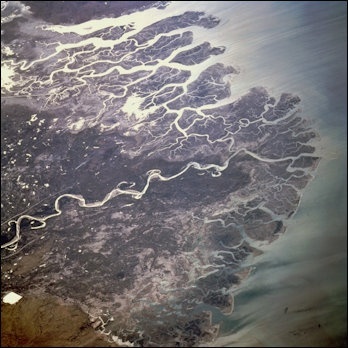
Indus River Delta
Arrian wrote: “While their vessels were moored here, the phenomenon of the ebb and flow of the tide in the great sea occurred, so that their ships were left upon dry ground. This caused Alexander and his companions no small alarm, inasmuch as they were previously quite unacquainted with it. But they were much more alarmed when, the time coming round again, the water approached and the hulls of the vessels were raised aloft. The ships which it caught settled in the mud were raised aloft without any damage, and floated again without receiving any injury; but those that had been left on the drier land and had not a firm settlement, when an immense compact wave advanced, either fell foul of each other or were dashed against the land and thus shattered to pieces. [Source: Arrian the Nicomedian (A.D. 92-175), “Anabasis of Alexander”, translated, by E. J. Chinnock, London: Hodder and Stoughton, 1884, gutenberg.org ]
“When Alexander had repaired these vessels as well as his circumstances permitted, he sent some men on in advance down the river in two boats to explore the island at which the natives said he must moor his vessels in his voyage to the sea. They told him that the name of the island was Cilluta. As he was informed that there were harbours in this island, that it was a large one and had plenty of water in it, he made the rest of his fleet put in there; but he himself with the best sailing ships advanced beyond, to see if the mouth of the river afforded an easy voyage out into the open sea. After advancing about stades from the first island, they descried another which was quite out in the sea. Then indeed they returned to the island in the river; and having moored his vessels near the extremity of it, Alexander offered sacrifice to those gods to whom he said he had been directed by Ammon to sacrifice. On the following day he sailed down to the other island which was in the deep sea; and having come to shore here also, he offered other sacrifices to other gods and in another manner. These sacrifices he also offered according to the oracular instructions of Ammon. Then having gone beyond the mouths of the river Indus, he sailed out into the open sea, as he said, to discover if any land lay anywhere near in the sea; but in my opinion, chiefly that he might be able to say that he had navigated the great outer sea of India. There he sacrificed some bulls to Poseidon and cast them into the sea; and having poured out a libation after the sacrifice, he threw the goblet and bowls, which were golden, into the deep as thank-offerings, praying the god to escort safely for him the fleet, which he intended to despatch to the Persian Gulf and the mouths of the Euphrates and Tigres.”
Exploration of the Mouths of the Indus
Arrian wrote: “Returning to Patala, he found that the citadel had been fortified and that Peithon had arrived with his army, having accomplished everything for which he was despatched. He ordered Hephaestion to prepare what was needful for the fortification of a naval station and the construction of dockyards; for he resolved to leave behind here a fleet of many ships near the city of Patala, where the river Indus divides itself into two streams. He himself sailed down again into the Great Sea by the other mouth of the Indus, to ascertain which branch of the river is easier to navigate. The mouths of the river Indus are about stades distant from each other. In the voyage down he arrived at a large lake in the mouth of the river, which the river makes by spreading itself out; or perhaps the waters of the surrounding district draining into it make it large, so that it very much resembles a gulf of the sea. For in it were seen fish like those in the sea, larger indeed than those in our sea. [Source: Arrian the Nicomedian (A.D. 92-175), “Anabasis of Alexander”, translated, by E. J. Chinnock, London: Hodder and Stoughton, 1884, gutenberg.org ]
“Having moored his ships then in this lake, where the pilots directed, he left there most of the soldiers and all the boats with Leonnatus; but he himself with the thirty-oared galleys and the vessels with one and a half row of oars passed beyond the mouth of the Indus, and advancing into the sea also this way, ascertained that the outlet of the river on this side (i.e. the west) was easier to navigate than the other. He moored his ships near the shore, and taking with him some of the cavalry went along the sea-coast three days’ journey, exploring what kind of country it was for a coasting voyage, and ordering wells to be dug, so that the sailors might have water to drink. He then returned to the ships and sailed back to Patala; but he sent a part of his army along the sea-coast to effect the same thing, instructing them to return to Patala when they had dug the wells. Sailing again down to the lake, he there constructed another harbour and dockyard; and leaving a garrison for the place, he collected sufficient food to supply the army for four months, as well as whatever else he could procure for the coasting voyage.”
Campaign against the Oritians
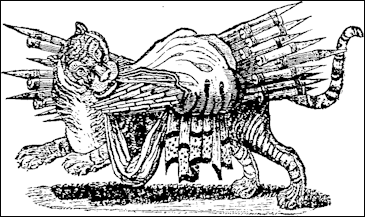
One last battle in India
Arrian wrote: “The season of the year was then unfit for voyaging; for the periodical winds prevailed, which at that season do not blow there from the north, as with us, but from the Great Sea, in the direction of the south wind. Moreover it was reported that there the sea was fit for navigation after the beginning of winter, from the setting of the Pleiades until the winter solstice; for at that season mild breezes usually blow from the land, drenched as it has been with great rains; and these winds are convenient on a coasting voyage both for oars and sails. Nearchus, who had been placed in command of the fleet, waited for the coasting season; but Alexander, starting from Patala, advanced with all his army as far as the river Arabius. [Source: Arrian the Nicomedian (A.D. 92-175), “Anabasis of Alexander”, translated, by E. J. Chinnock, London: Hodder and Stoughton, 1884, gutenberg.org ]
“He then took half of the shield-bearing guards and archers, the infantry regiments called foot Companions, the guard of the Companion cavalry, a squadron of each of the other cavalry regiments, and all the horse-bowmen, and turned away thence on the left towards the sea to dig wells, so that there might be abundance of them for the fleet sailing along on the coasting voyage; and at the same time to make an unexpected attack upon the Oritians, a tribe of the Indians in this region, which had long been independent. This he meditated doing because they had performed no friendly act either to himself or his army. He placed Hephaestion in command of the forces left behind. The Arabitians, another independent tribe dwelling near the river Arabius, thinking that they could not cope with Alexander in battle, and yet being unwilling to submit to him, fled into the desert when they heard that he was approaching. But crossing the river Arabius, which was both narrow and shallow, and travelling by night through the greater part of the desert, he came near the inhabited country at daybreak. Then ordering the infantry to follow him in regular line, he took the cavalry with him, dividing it into squadrons, that it might occupy a very large part of the plain, and thus marched into the land of the Oritians. All those who turned to defend themselves were cut to pieces by the cavalry, and many of the others were taken prisoners. He then encamped near a small piece of water; but when Hephaestion formed a junction with him, he advanced farther. Arriving at the largest village of the tribe of the Oritians, which was called Rhambacia, he commended the place and thought that if he colonized a city there it would become great and prosperous. He therefore left Hephaestion behind to carry out this project.”
Alexander the Great Reaches the Arabian Sea
Plutarch wrote: “His voyage down the rivers took up seven months’ time, and when he came to the sea, he sailed to an island which he himself called Scillustis, others Psiltucis, where going ashore, he sacrificed, and made what observations he could as to the nature of the sea and the sea-coast. Then having besought the gods that no other man might ever go beyond the bounds of this expedition, he ordered his fleet, of which he made Nearchus admiral, and Onesicritus pilot, to sail round about, keeping the Indian shore on the right hand, and returned himself by land through the country of the Orites, where he was reduced to great straits for want of provisions, and lost a vast number of men, so that of an army of one hundred and twenty thousand foot and fifteen thousand horse, he scarcely brought back above a fourth part out of India, they were so diminished by diseases, ill diet, and the scorching heats, but most by famine. For their march was through an uncultivated country whose inhabitants fared hardly, possessing only a few sheep, and those of a wretched kind, whose flesh was rank and unsavory, by their continual feeding upon sea-fish. [Source: Plutarch (A.D. 45-127), “Life of Alexander”, A.D. 75 translated by John Dryden, 1906, MIT, Online Library of Liberty, oll.libertyfund.org ]
“After sixty days march he came into Gedrosia, where [244] he found great plenty of all things, which the neighboring kings and governors of provinces, hearing of his approach, had taken care to provide. When he had here refreshed his army, he continued his march through Carmania, feasting all the way for seven days together. He with his most intimate friends banqueted and revelled night and day upon a platform erected on a lofty, conspicuous scaffold, which was slowly drawn by eight horses. This was followed by a great many chariots, some covered with purple and embroidered canopies, and some with green boughs, which were continually supplied afresh, and in them the rest of his friends and commanders drinking, and crowned with garlands of flowers. Here was now no target or helmet or spear to be seen; instead of armor, the soldiers handled nothing but cups and goblets and Thericlean drinking vessels, which, along the whole way, they dipped into large bowls and jars, and drank healths to one another, some seating themselves to it, others as they went along.
All places resounded with music of pipes and flutes, with harping and singing, and women dancing as in the rites of Bacchus. For this disorderly, wandering march, besides the drinking part of it, was accompanied with all the sportiveness and insolence of bacchanals, as much as if the god himself had been there to countenance and lead the procession. As soon as he came to the royal palace of Gedrosia, he again refreshed and feasted his army; and one day after he had drunk pretty hard, it is said, he went to see a prize of dancing contended for, in which his favorite Bagoas, having gained the victory, crossed the theatre in his dancing habit, and sat down close by him, which so pleased the Macedonians, that they made loud acclamations for him to kiss Bagoas, and never stopped clapping their hands and shouting till Alexander put his arms round him and kissed him.
Image Sources: Wikimedia Commons
Text Sources: Internet Ancient History Sourcebook: Greece sourcebooks.fordham.edu ; Internet Ancient History Sourcebook: Hellenistic World sourcebooks.fordham.edu ; BBC Ancient Greeks bbc.co.uk/history/ ; Canadian Museum of History historymuseum.ca ; Perseus Project - Tufts University; perseus.tufts.edu ; MIT, Online Library of Liberty, oll.libertyfund.org ; Gutenberg.org gutenberg.org Metropolitan Museum of Art, National Geographic, Smithsonian magazine, New York Times, Washington Post, Los Angeles Times, Live Science, Discover magazine, Times of London, Natural History magazine, Archaeology magazine, The New Yorker, Encyclopædia Britannica, "The Discoverers" [∞] and "The Creators" [μ]" by Daniel Boorstin. "Greek and Roman Life" by Ian Jenkins from the British Museum.Time, Newsweek, Wikipedia, Reuters, Associated Press, The Guardian, AFP, Lonely Planet Guides, “World Religions” edited by Geoffrey Parrinder (Facts on File Publications, New York); “History of Warfare” by John Keegan (Vintage Books); “History of Art” by H.W. Janson Prentice Hall, Englewood Cliffs, N.J.), Compton’s Encyclopedia and various books and other publications.
Last updated September 2020
- Google+
Page Top
This site contains copyrighted material the use of which has not always been authorized by the copyright owner. Such material is made available in an effort to advance understanding of country or topic discussed in the article. This constitutes 'fair use' of any such copyrighted material as provided for in section 107 of the US Copyright Law. In accordance with Title 17 U.S.C. Section 107, the material on this site is distributed without profit. If you wish to use copyrighted material from this site for purposes of your own that go beyond 'fair use', you must obtain permission from the copyright owner. If you are the copyright owner and would like this content removed from factsanddetails.com, please contact me.
Alexander the Great Invades India
An Indian History Story for Children
- India Past and Present
- Important Texts
- Temples and Organizations
- Indian Arts and Culture
- Hindu Gurus and Saints
- M.A., English Literature, University of North Bengal
The following text is excerpted from " Our Empire Story " by H. E. Marshall.
India is no new-discovered land. At a time when England was still unknown, still lost in the cold gray mists of the ocean, ships sailed from India's sunny shores, and caravans wound through the sandy deserts laden with silks and muslins, with gold and jewels and spices.
For through long ages India has been a place of trade. The splendors of King Solomon came from out the East. He must have traded with India when he built great ships and sent "his shipmen that had knowledge of the sea" to sail to the far land of Ophir, which perhaps may have been in Africa or equally perhaps the island of Ceylon. From there these ship-men fetched such "great plenty" of gold and precious stones, that "silver was nothing accounted of in the days of Solomon."
The court, too, of many an ancient heathen king and queen was made rich and beautiful by the treasures of the East. Yet little was known of the land of gold and spice, of gems and peacocks. For beside the merchants, who grew rich with their traffickings, few journeyed to India.
But at length, in 327 B.C., the great Greek conqueror Alexander found his way there. Having subdued Syria, Egypt, and Persia, he next marched to invade the unknown land of gold.
Alexander Arrives in India
The part of India which Alexander invaded is called the Punjab, or land of the five rivers. At that time it was ruled by a king called Porus. He was overlord of the Punjab, and under him were many other princes. Some of these princes were ready to rebel against Porus, and they welcomed Alexander gladly. But Porus gathered a great army and came marching against the Greek invader.
On one side of a wide river lay the Greeks, on the other side lay the Indians. It seemed impossible for either to cross. But in the darkness of a stormy night, Alexander and his men passed over, wading part of the way breast high.
A great battle was fought. For the first time, the Greeks met elephants in war. The huge beasts were very terrible to look upon. Their awful trumpetings made the Greek horses shiver and tremble. But Alexander's soldiers were far better drilled and far stronger than the Indians. His horsemen charged the elephants in flank, and they stung to madness by the Greek darts, turned to flee, trampling many of the soldiers of Porus to death in their fright. The Indian war-chariots stuck fast in the mud. Porus himself was wounded. At length, he yielded to the conqueror.
But now that Porus was defeated Alexander was gracious to him, and treated him as one great king and warrior should treat another. Henceforth they became friends.
As Alexander marched through India he fought battles, built altars, and founded cities. One city he called Boukephala in honor of his favorite horse Bucephalus, who died and was buried there. Other cities he called Alexandria in honor of his own name.
Continuing the Journey
As they journeyed, Alexander and his soldiers saw many new and strange sights. They passed through boundless forests of mighty trees beneath whose branches roosted flocks of wild peacocks. They saw serpents, glittering with golden scales, glide swiftly through the underwood. They stared in wonder at fearful combats of beasts and told strange stories when they returned home, of dogs that were not afraid to fight with lions, and of ants that dug for gold.
At length, Alexander reached the city of Lahore and marched on to the banks of the river Sutlej beyond. He was eager to reach the holy river the Ganges and conquer the people there. But his men had grown weary of the hardships of the way, weary of fighting under the burning suns or torrent rains of India, and they begged him to go no further. So, greatly against his will, Alexander turned back.
The Greeks did not return as they had come. They sailed down the rivers Jhelum and Indus. And so little was known of India in those days, that they believed at first that they were upon the Nile and that they would return home by way of Egypt. But they soon discovered their mistake, and after long journeyings reached Macedonia again.
The Legacy of Alexanders Conquest
It was only the north of India through which Alexander had marched. He had not really conquered the people, although he left Greek garrisons and Greek rulers behind him, and when he died the people quickly revolted against the rule of Macedonia. So all trace of Alexander and his conquests soon disappeared from India. His altars have vanished and the names of the cities which he founded have been changed. But for long ages, the deeds of the great "Secunder," as they called him, lived in the memory of the Indians.
And it is since the time of Alexander that the people of the West have known something of the wonderful land in the East with which they had traded through many centuries.
- The Ramayana: Summary by Stephen Knapp
- Holi the Hindu Festival of Colors
- The Love Songs of Sarojini Naidu
- Rakhi: The Thread of Sibling Love
- Kuber the Lord of Riches
- Immortal Love Legends
- Characters of the Mahabharata: Glossary of Names (A to H)
- Characters of the Mahabharata: Glossary of Names (P to Y)
- Vedic Women
- Famous Female Figures of Vedic India
- 30 Quotes In Praise of India
- India's National Anthem, 'Jana Gana Mana'
- A Guide to the 6 Seasons of the Hindu Calendar
- The Ganesha Milk Miracle
- Gandhi Quotes About God and Religion
- What Is the Hindu Calendar System?
- Recent changes
- Random page
- View source
- What links here
- Related changes
- Special pages
- Printable version
- Permanent link
- Page information
- Create account
Why was Alexander the Great So Successful In His Conquests
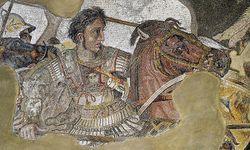
In the public's mind, few well-known conquerors in history match the exploits of Alexander the Great. In just a few years, from 334-330 BC, Alexander would conquer the largest empire the world had known and establish his empire that eventually stretched from Greece to India. Furthermore, Alexander began a process where Greek culture began to intermix with ancient Near Eastern, Egyptian, Central Asian, and Indian cultures that influenced much of the Old World for many centuries.
The exchange of ideas and trade brought about an era of unprecedented prosperity and knowledge that advanced the ancient world's sciences. It led to many discoveries that would not be replicated until the Renaissance in the 15 or 16th century AD. What is remarkable is he achieved all of this by the age of 32 at the time of his death in Babylon. However, the root of all the social change that would eventually influence Europe, the Near East, Egypt, and much of Asia rested in his ability to conquer many territories and do it quickly. The question is, how did he do this?
What region did Alexander conquer first?
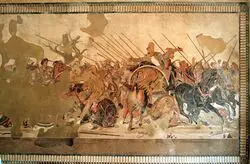
Alexander took power after the death of his father, Philip II of Macedon, who had already planned to invade the Persian, Achaemenid Empire. [1] His first battles were Greece and the Balkans, where he consolidated his power while suppressing several revolts.
Shortly after crossing into Asia Minor in 334 BC with perhaps 30,000-50,000 troops, Alexander quickly won his first major battle at Granicus. [2] This victory allowed him to take the western half of Asia Minor. After a few sieges and taking Sardis, one of the most important cities in Asia Minor, he proceeded toward Syria. He encountered the Persian King Darius III in 333 at Issus's battle. [3] This is the first major battle he had with the Persian king, and once again, Alexander proved his excellent strategic thinking by outflanking the Persian army through his cavalry. He made a direct attack on the Persian king's centerline, where this key moment in the battle became a famous Roman-era mosaic found in Pompeii (Figure 1).
How did Alexander conquer the Levant, Syria, and Egypt?
After the battle of Issus, Alexander took the Levant and the coastal Mediterranean cities, which were important trading cities and allowed the Achaemenids to derive much of their wealth, establish their navy, and proceed into Egypt. In Syria and the Levant, his only major encounters were the sieges of Tyre and Gaza in 332 BC. [4] In Egypt, he was quickly accepted by the local population, as the Egyptians had revolted against the Achaemenids not long before Alexander and, therefore, saw this as an opportunity for new leadership.
Here, he became considered Amun's son, the chief of the Egyptian pantheon, further exalting him in his new subjects' eyes. Alexander also began the process of founding cities, the most famous of which was Alexandria. Its position along the Mediterranean reflects a key change, where Egypt and the eastern Mediterranean worlds would be more strongly integrated into culture and trade in the centuries to come. [5] That was Alexander's intention from the outset, showing that he likely had long-term, strategic thinking about the nature and future of his conquered lands long after his own time.
What was the Battle of Gaugamela?
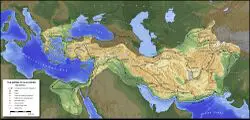
The Achaemenids perhaps had one more great chance to defeat Alexander at Gaugamela's battle near modern-day Erbil. Once again, Alexander's tactics proved decisive where his forces formed a wedge-shaped attack that then tore into Darius' center, causing the king to flee the battle likely. With this battle secure, all of Mesopotamia fell to Alexander, and Alexander entered Babylon's great city without any need for combat. At Babylon, Alexander perhaps decided he would make the city the new capital of his now vast empire, as it would unite the Greek and Near Eastern worlds more closely. Alexander then went on to take Susa, the old capital of the Persians, and then the ceremonial capital of Persepolis, which was at least partially burned most likely by Alexander's troops.

Only one more major battle was fought against the Persians at the Persian Gates battle, a strategic crossing. [6] After this, Darius III was killed by one of his generals, and Achaemenid factions continued to lead a guerilla-style war against Alexander. However, they squabbled between themselves over the remains of their empire.
What was the Fall of the Achaemenids?
This division allowed Alexander to reach Central Asia with only minor resistance easily. He founded many cities along the way that gained importance during the rise of the Silk Road. This included the city of Kandahar in Afghanistan and eventually reaching Tajikistan, almost near the edge of Tibet. His wars continued in Central Asia and India, where he initially encountered major resistance. [7]
Alexander's battles were the first where European armies had encountered war elephants, which likely caused great fear in his army before eventually overcoming them in battle. Nevertheless, the difficulty of long campaigning and undoubtedly losing many men led to his men tiring of conflict and eventually forcing Alexander to pull his forces back, finally reaching once again Babylon. By the time Alexander finished campaigning, he had created the first empire that connected Europe with Central Asia (Figure 2).
Why Was Alexander the Great Successful?
Alexander's success lay in his military genius, knowing how to use his cavalry and troops precisely at key moments in battle. It seemed he was close to defeat several times but could use the situation to his advantage by luring his enemies into a deeper trap. Furthermore, his troops were well trained in holding their positions and not panicking in battle. [8] However, a lot of the success had little to do with Alexander but the Achaemenid Empire's nature.
The Achaemenids were perhaps the most successful empire up to that point. They had succeeded in uniting a vast territory and genuinely integrating it into a cohesive realm that traded extensively and had well-maintained roads. The Achaemenid state was prosperous, and people had by then began to move and live in areas far from their homelands. The world, in essence, had become smaller thanks to many of their tolerant policies.
What was Alexander's legacy?
While it is true that Egypt and some other regions had revolted against them, many had benefited from the Achaemenids. Therefore, it is no wonder that Alexander marries Persian royalty and eventually takes on the regalia of the Achaemenid kings. This is also why he had planned for Babylon to be his new capital. It was one of the chief cities and capitals of the Achaemenid Empire despite being in Mesopotamia. Commerce had now become the glue that bound many regions, and Alexander understood this. This probably led to his men resenting Alexander's penchant for the Achaemenids, as the Greeks still held beliefs that the Persians were not on the same level as them.
While Alexander died before realizing his dream of a super empire, the east's benefits became more apparent to his generals and men. Many of them stayed after the wars. New Greek populations began to migrate to the Near East, and the process of mixing Hellenic and eastern cultures had started. The mixture of Greece and the Nearly mixed knowledge and created an integrated understanding that facilitated the rise of astronomy, physics, mathematics, and other scientific fields. Alexander's legacy lasted long after his death. His military success paved the way for the tremendous Classical achievements that eventually became one of the foundations of the Renaissance and our modern Western world.
Related DailyHistory.org Articles
- What was Plato's academy and why did it influence Western thought?
- Alexander the Great Top Ten Booklist
- What Factors Led to the Creation of the First Cities?
- How Did Early Judicial Systems Evolve?
- ↑ For more on Alexander's father and his plans of conquests, see: Carney, Elizabeth Donnelly, and Daniel Ogden, eds. 2010. Philip II and Alexander the Great: Father and Son, Lives and Afterlives . Oxford ; New York: Oxford University Press.
- ↑ For more on this battle, see: Matthews, Rupert. 2008. Alexander the Great at the Battle of Granicus . Stroud: Spellmount.
- ↑ For more on the battle of Issus, see Delbrück, Hans. 1975. History of the Art of War . Lincoln, Neb: University of Nebraska Press/ Bison Book, pg. 191.
- ↑ For more on Alexander's campaigns in the Levant and Syria, see: Freeman, Philip. 2011. Alexander the Great . New York: Simon & Schuster, pg. 26.
- ↑ For more on Alexander's time in Egypt, Bowman, Alan K. 1996. Egypt after the Pharaohs: 332 BC-AD 642 ; from Alexander to the Arab Conquest. 2. paperback printing. Berkeley, Calif.: Univ. of California Press, pg. 22
- ↑ For More on the Battles of Gaugamela and Alexander's later battles against the Persians, see: Wilcken, Ulrich, and Eugene N. Borza. 1967. Alexander the Great. Norton Library. New York: Norton, pg. 60.
- ↑ For more on Alexander's campaigns in Central Asia and India, see: Roy, Kaushik. 2004. India’s Historic Battles: From Alexander the Great to Kargil . Delhi : Bangalore: Permanent Black ; Distributed by Orient Longman, pg. 29
- ↑ For more on the battle tactics of Alexander, see Bose, Partha Sarathi. 2004. Alexander the Great’s Art of Strategy: Lessons from the Great Empire Builder . London: Profile.
Updated March 22, 2021
Admin , Maltaweel , EricLambrecht and Jaredkrebsbach
- Ancient History
- Greek History
- Near East History
- Ancient Greek History
- Hellenistic Period
- Alexander the Great
- This page was last edited on 17 September 2021, at 16:37.
- Privacy policy
- About DailyHistory.org
- Disclaimers
- Mobile view

We will keep fighting for all libraries - stand with us!
Internet Archive Audio

- This Just In
- Grateful Dead
- Old Time Radio
- 78 RPMs and Cylinder Recordings
- Audio Books & Poetry
- Computers, Technology and Science
- Music, Arts & Culture
- News & Public Affairs
- Spirituality & Religion
- Radio News Archive

- Flickr Commons
- Occupy Wall Street Flickr
- NASA Images
- Solar System Collection
- Ames Research Center

- All Software
- Old School Emulation
- MS-DOS Games
- Historical Software
- Classic PC Games
- Software Library
- Kodi Archive and Support File
- Vintage Software
- CD-ROM Software
- CD-ROM Software Library
- Software Sites
- Tucows Software Library
- Shareware CD-ROMs
- Software Capsules Compilation
- CD-ROM Images
- ZX Spectrum
- DOOM Level CD

- Smithsonian Libraries
- FEDLINK (US)
- Lincoln Collection
- American Libraries
- Canadian Libraries
- Universal Library
- Project Gutenberg
- Children's Library
- Biodiversity Heritage Library
- Books by Language
- Additional Collections

- Prelinger Archives
- Democracy Now!
- Occupy Wall Street
- TV NSA Clip Library
- Animation & Cartoons
- Arts & Music
- Computers & Technology
- Cultural & Academic Films
- Ephemeral Films
- Sports Videos
- Videogame Videos
- Youth Media
Search the history of over 866 billion web pages on the Internet.
Mobile Apps
- Wayback Machine (iOS)
- Wayback Machine (Android)
Browser Extensions
Archive-it subscription.
- Explore the Collections
- Build Collections
Save Page Now
Capture a web page as it appears now for use as a trusted citation in the future.
Please enter a valid web address
- Donate Donate icon An illustration of a heart shape
Alexander the Great [and India]
Bookreader item preview, share or embed this item, flag this item for.
- Graphic Violence
- Explicit Sexual Content
- Hate Speech
- Misinformation/Disinformation
- Marketing/Phishing/Advertising
- Misleading/Inaccurate/Missing Metadata
plus-circle Add Review comment Reviews
2 Favorites
DOWNLOAD OPTIONS
In collections.
Uploaded by RobertBedrosian on May 4, 2023
SIMILAR ITEMS (based on metadata)
The Achievements and Influence of Alexander the Great
This essay about Alexander the Great examines his rise to power, military successes, and the cultural impact of his conquests. Born in 356 BC, Alexander quickly established one of history’s largest empires by the age of thirty. His strategic brilliance, demonstrated in battles like Issus, enabled him to overthrow the Persian Empire and extend his territory from Greece to India. The essay highlights how his founding of cities like Alexandria promoted the blend of Greek culture with other civilizations, initiating the Hellenistic Age. Furthermore, it discusses Alexander’s innovative governance style, which embraced local customs and governance structures, facilitating the integration of diverse cultures. Despite his empire’s rapid fragmentation after his death, his influence shaped Western civilization profoundly. The essay underscores Alexander’s enduring legacy in military strategy, cultural fusion, and political administration.
How it works
One of the most fascinating and charismatic historical personalities is still Alexander the Great. Alexander came to the throne following the assassination of his father, King Philip II, and was born at Pella, Macedonia, in 356 BC. His quick ascent to prominence and subsequent conquests profoundly impacted the development of Western civilization and reshaped the political and cultural climate of antiquity.
Alexander showed glimpses of brilliance from the outset. He learned philosophy, medicine, and science under Aristotle’s guidance, which expanded his horizons and prepared him for the difficulties that were ahead.
Still, his military intelligence was what really made him stand out. He established one of the greatest empires in antiquity by the time he was thirty years old, spanning from Greece to northwest India.
Alexander’s conquests began with the consolidation of the Greek city-states and the overthrow of the Persian Empire, a feat that had eluded many before him. His strategy at the Battle of Issus in 333 BC, where he defeated a much larger Persian army led by King Darius III, is still studied in military schools for its brilliant tactics and audacious execution. Following this victory, Alexander’s forces swept through the Eastern Mediterranean, securing Egypt and the ancient city of Babylon. In Egypt, he founded the city of Alexandria, which would become a hub of learning and culture for centuries to come.
Beyond his military conquests, Alexander’s legacy includes the cultural diffusion that his empire fostered. The Hellenistic Age, sparked by his conquests, saw Greek language, art, and culture merge with those of the Persians, Egyptians, and other civilizations. This blend gave rise to advancements in science, philosophy, and the arts, profoundly influencing subsequent generations. Figures such as Archimedes, Euclid, and even later, Roman scholars, drew from knowledge that spread during this period.
Perhaps one of Alexander’s most lasting impacts was his approach to governance. Unlike many conquerors, Alexander adopted elements of the cultures of the people he defeated. By incorporating locals into his administration and adopting some of their customs, he fostered a level of cooperation and unity that was rare for his time. This strategy not only secured his hold over a vast territory but also facilitated the mixing of Eastern and Western customs.
Despite his successes, Alexander’s reign was not without its challenges. His relentless pursuit of conquest and his early death at the age of 32 left his empire without a strong successor, leading to its fragmentation under the wars of the Diadochi (his generals). Yet, even in its division, the spread of Hellenistic culture continued, testifying to the enduring influence of his vision.
In examining the life and legacy of Alexander the Great, it is clear that his achievements were not merely the result of military might but also of his visionary approach to leadership and governance. His ability to assimilate different cultures, coupled with his unquenchable thirst for expansion, created an empire that, though short-lived, shaped the cultural and political contours of the ancient world. Alexander’s legacy is a testament to the power of ambitious leadership and strategic foresight—a narrative that continues to captivate historians and scholars today.
In conclusion, while the empire Alexander built disintegrated rapidly after his death, the cultural and political impacts of his conquests are undeniable. The Hellenistic period, marked by an incredible fusion of cultures and ideas, set the stage for the Roman Empire and ultimately laid the groundwork for the modern Western world. Alexander’s story is a potent reminder of how the actions of a single individual can alter the course of history profoundly.
Cite this page
The Achievements and Influence of Alexander the Great. (2024, May 21). Retrieved from https://papersowl.com/examples/the-achievements-and-influence-of-alexander-the-great/
"The Achievements and Influence of Alexander the Great." PapersOwl.com , 21 May 2024, https://papersowl.com/examples/the-achievements-and-influence-of-alexander-the-great/
PapersOwl.com. (2024). The Achievements and Influence of Alexander the Great . [Online]. Available at: https://papersowl.com/examples/the-achievements-and-influence-of-alexander-the-great/ [Accessed: 22 May. 2024]
"The Achievements and Influence of Alexander the Great." PapersOwl.com, May 21, 2024. Accessed May 22, 2024. https://papersowl.com/examples/the-achievements-and-influence-of-alexander-the-great/
"The Achievements and Influence of Alexander the Great," PapersOwl.com , 21-May-2024. [Online]. Available: https://papersowl.com/examples/the-achievements-and-influence-of-alexander-the-great/. [Accessed: 22-May-2024]
PapersOwl.com. (2024). The Achievements and Influence of Alexander the Great . [Online]. Available at: https://papersowl.com/examples/the-achievements-and-influence-of-alexander-the-great/ [Accessed: 22-May-2024]
Don't let plagiarism ruin your grade
Hire a writer to get a unique paper crafted to your needs.

Our writers will help you fix any mistakes and get an A+!
Please check your inbox.
You can order an original essay written according to your instructions.
Trusted by over 1 million students worldwide
1. Tell Us Your Requirements
2. Pick your perfect writer
3. Get Your Paper and Pay
Hi! I'm Amy, your personal assistant!
Don't know where to start? Give me your paper requirements and I connect you to an academic expert.
short deadlines
100% Plagiarism-Free
Certified writers
- India Today
- Business Today
- Reader’s Digest
- Harper's Bazaar
- Brides Today
- Cosmopolitan
- Aaj Tak Campus
- India Today Hindi
Italian Open: Alexander Zverev wins sixth Masters title after beating Nicolas Jarry
Alexander zverev won the italian open 2024 men’s singles title after beating nicolas jarry 6-4, 7-5 in the final on sunday, may 19. he will also climb in the rankings after his campaign in rome..
Listen to Story

- Alexander Zverev won the Italian Open 2024
- Zverev defeated Nicolas Jarry 6-4, 7-5 in the final
- Zverev won his second title in Rome after 2017
Alexander Zverev warmed up for the French Open by winning his sixth Masters title when he beat first-time finalist Nicolas Jarry 6-4, 7-5 in the Italian Open showpiece on Sunday.
It was a second title in Rome for Zverev, having won his first in 2017 when he was 20, and his first trophy since he broke his ankle in the French Open semi-finals in 2022.
The 27-year-old will also climb to fourth in the rankings as he slowly returns to his best ahead of Roland Garros.
"Obviously, winning my first ever (Masters title) here in Rome and winning my first after my injury also in Rome, so Rome is a very special place for me. It is a very, very special week," third seed Zverev said.
Zverev after winning Rome: “Hello, my name is Jannik” 💀 pic.twitter.com/oqlaayYKOI — The Tennis Letter (@TheTennisLetter) May 19, 2024
‘Jarry playing incredible tennis’
However, Jarry managed to save three match points before Zverev finally clinched victory in Rome, where he dropped only one set in the tournament.
"He is playing huge, and you can see by the players he has beaten here this week, (he is) playing incredible tennis," Zverev said of Jarry.
"I told him if he continues to play like that he will have many chances at this level. Today I am extremely happy to be the winner." Published By: sabyasachi chowdhury Published On: May 20, 2024 Also Read | Italian Open 2024: Iga Swiatek thumps Aryna Sabalenka to win third title in Rome

IMAGES
VIDEO
COMMENTS
The Indian campaign of Alexander the Great began in 327 BC and lasted until 325 BC. After conquering the Achaemenid Persian Empire, the Macedonian army undertook an expedition into the northwestern Indian subcontinent.Within two years, Alexander expanded the Macedonian Empire to include present-day Punjab and Sindh in what is modern-day Pakistan, surpassing the earlier frontiers that had been ...
Go here for more about the Depart! speech by Alexander the Great. It follows the text transcript of the Depart! speech by Alexander the Great, delivered at Opis, Mesopotamia - August 324 BC. This is Alexander's speech according to the Greek historian Arrian. The speech which I am about to deliver will not be for the purpose of checking your ...
Listen to and hear Alexander the Great's epic speech to his officers at Hydaspes River, India in 326 BC who wish to quit fighting and return home, as recorde...
Arrian: Speech of Alexander the Great, from The Campaigns of Alexander I observe, gentlemen, that when I would lead you on a new venture you no longer follow me with your old spirit. I have asked you to meet me that we may come to a decision together: are we, upon my advice, to go forward, or, upon yours, to turn
The so-called Hyphasis Mutiny was a conflict between Alexander the Great (356-323 BCE) and his army following their victory at the river Hydaspes in 326 BCE. Alexander voiced plans for further conquests in the Indian subcontinent, however, when his men reached the river Hyphasis, there was an open revolt. The mutiny ended with Alexander giving in to his men's wishes and turning back; he did ...
The Battle of Gaugamela (1st October 331 BCE, also known as the Battle of Arbela) was the final meeting between Alexander the Great of Macedon and King Dariu...
Philip proposed to invade the Persian empire, his first goal to liberate the Greek city states in Asia Minor. But Philip was assassinated in 336 b.c. at the age of 46 before his plans could reach fruition. Alexander, a young man who had shown his mettle in battle but was still only 20 years old, assumed the crown.
Alexander the Great spent only a few years in the Indian subcontinent and his conquests there were short-lived. After campaigning along the Indus river and i...
The Indian campaign of Alexander the Great began in 326 BC. After conquering the Achaemenid Empire of Persia, the Macedonian king (and now the great king of the Persian Empire), Alexander, launched a campaign into the Indian subcontinent. The rationale for this campaign is usually said to be Alexander's desire to conquer the entire known world ...
Overview. Alexander the Great was famous for his military power and is a legendary figure in history. Much of what we know about Alexander the Great is unreliable and steeped in myth; a lot of these mythologies were used by Alexander's successors. In the Kingdom of Thrace, during the reign of Lysimachus—a successor of Alexander the Great ...
Alexander's Speech to the Officers. Alexander made a fervent appeal to his comrades to rumours and follow him with "alacrity and confidence." ... who have the repute of being the bravest people of India, he ran in great danger of his life. For having beaten off the defendants with showers of arrows, he was the first man that mounted the ...
The second section. excavates the images of Alexander current in both Britain and India during the. 19th century. Here the goal is to assess the way positive and negative repre- sentations of the 'Macedonian conqueror' were used and how they inspired particular ideas about Britain's place in India.
Alexander Arrives in India. The part of India which Alexander invaded is called the Punjab, or land of the five rivers. At that time it was ruled by a king called Porus. He was overlord of the Punjab, and under him were many other princes. Some of these princes were ready to rebel against Porus, and they welcomed Alexander gladly.
But it is not so. You and I, gentlemen, have shared the labour and shared the danger, and the rewards are for us all. The conquered territory belongs to you; from your ranks the governors of it are chosen; already the greater part of its treasure passes into your hands, and when all Asia is overrun, then indeed I will go further than the mere ...
Alexander the Great (r. 336-323 BCE) of Macedon led his army on a series of campaigns which successfully conquered the then-known world from Macedon, through Greece, down to Egypt, across Persia, to India. Alexander's tutor was the Greek philosopher Aristotle (384-322 BCE) who impressed upon him the value of Greek culture and philosophy.
In just a few years, from 334-330 BC, Alexander would conquer the largest empire the world had known and establish his empire that eventually stretched from Greece to India. Furthermore, Alexander began a process where Greek culture began to intermix with ancient Near Eastern, Egyptian, Central Asian, and Indian cultures that influenced much of ...
"Alexander the Great," by E. R. Bevan, Chapter 15 from Cambridge History of India, Volume 1 (Cambridge, 1922), in 60 bookmarked and searchable pdf pages. Wikipedia has an entry on the Indian campaign of Alexander, which took place in 327-325 B.C. Internet Archive has other works by the author, as well as a selection of works about Alexander and ...
Alexander the Great (born 356 bce, Pella, Macedonia [northwest of Thessaloníki, Greece]—died June 13, 323 bce, Babylon [near Al-Ḥillah, Iraq]) was the king of Macedonia (336-323 bce), who overthrew the Persian empire, carried Macedonian arms to India, and laid the foundations for the Hellenistic world of territorial kingdoms. Already in his lifetime the subject of fabulous stories, he ...
Alexander III of Macedon (Ancient Greek: Ἀλέξανδρος, romanized: Alexandros; 20/21 July 356 BC - 10/11 June 323 BC), most commonly known as Alexander the Great, was a king of the ancient Greek kingdom of Macedon. He succeeded his father Philip II to the throne in 336 BC at the age of 20 and spent most of his ruling years conducting a lengthy military campaign throughout Western ...
Credit: Alexander Gale / Greek Reporter. In August 324 BC, Alexander the Great faced a mutiny by his troops. By this time, Alexander had already conquered the Persian Empire and was master of much of the known world. Nevertheless, Alexander now faced a serious challenge to his authority posed by the very men who had loyally followed him into ...
Alexander the Great is one of the most extraordinary individuals in history. He became king of the fringe Greek kingdom of Macedonia in 336 BC at the age of just 20, and before his death twelve years later, had imposed Macedonian overlordship on Greece, destroyed the mighty Persian Empire and led an army deep into modern Afghanistan and to the Indian frontier.
Essay Example: One of the most fascinating and charismatic historical personalities is still Alexander the Great. Alexander came to the throne following the assassination of his father, King Philip II, and was born at Pella, Macedonia, in 356 BC. His quick ascent to prominence and subsequent
Arrian: Speech of Alexander the Great, from The Campaigns of Alexander. I observe, gentlemen, that when I would lead you on a new venture you no longer follow me with your old spirit. ... Come, then; add the rest of Asia to what you already possess--a small addition to the great sum of your conquests. What great or noble work could we ourselves ...
Alexander Zverev warmed up for the French Open by winning his sixth Masters title when he beat first-time finalist Nicolas Jarry 6-4, 7-5 in the Italian Open showpiece on Sunday. It was a second title in Rome for Zverev, having won his first in 2017 when he was 20, and his first trophy since he broke his ankle in the French Open semi-finals in ...
Alexander the Great is one of the most extraordinary individuals in history. He became king of the fringe Greek kingdom of Macedonia in 336 BC at the age of ...
Join us for this afternoon's commencement exercises for our graduating class of 2024. #ForeverToThee24